#it’s so strange because the books we read for women and gender studies were so good and these ones aren’t I guess her concussion did her in
Text
I think it’s so funny how every time I read my book for class I fall asleep as if my body can’t tolerate the bullshit I’m reading.
#payton goes to: college#I hate this book so much#I’ve got like half a chapter left and then one more section for Wednesday’s class and I’m done#but then we have to watch the film#I love how my professor didn’t consider choosing a book from a perspective of the negative impacts of colonization and went with this book#like she wants to expose the racism of colonization by using a book from the colonizer’s perspective which is kinda dumb#since the US already promotes that view#she didn’t really get my point and it didn’t feel like it would be meaningful to go in circles with her about it#it’s so strange because the books we read for women and gender studies were so good and these ones aren’t I guess her concussion did her in
1 note
·
View note
Text
Yentl: A Trans Man Studying Talmud is Distracted by Gay Thoughts
Yentl (1983, dir. Barbra Streisand) and Yentl the Yeshiva Boy by Isaac Bashevis Singer.
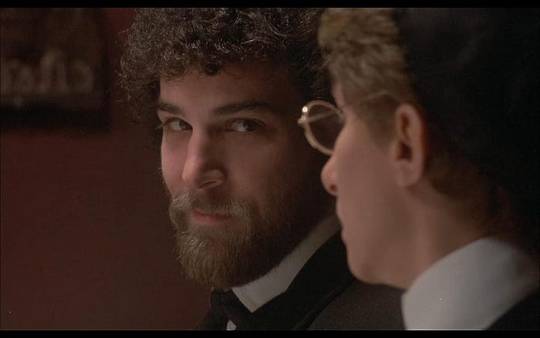
Any of us would be distracted from study by Mandy Patinkin. Via IMDb.
It’s a sad thing, hearing cisgender people talk about Yentl — especially the short story — and think they understand it, that they’re getting everything from it, while at the same time, they can’t conceive that transgender people even exist.
It’s a strangely joyful short story to read as a trans man, as sad and complex as it is, and the film has a similar bittersweet warmth to it.
“Yentl — you have the soul of a man.”
“So why was I born a woman?”
“Even Heaven makes mistakes.”
From Yentl the Yeshiva Boy, by Isaac Bashevis Singer
At the beginning of Yentl (1983), we see Barbra Streisand as the titular Yentl walking around in Yanev, ostensibly to buy groceries — including a fish — for dinner. She’s bored and distracted as the other women discuss how to study a fresh fish or how to distinguish between the different types — the bookseller is coming through town, calling out that he has novels and picture books for women and sacred books for men.
Yentl approaches the bookseller and surreptitiously takes one book from the men’s shelf, a book exploring the mysticism of creation and the similar mysticism of language that was being discussed by some yeshiva students a moment ago, and the bookseller interrupts her — “You’re in the wrong place, Miss. Books for women are over there.”
He tells her it’s the Law that women can’t study such books; she retorts, “Where is it written?”; he says, “Never mind where: it’s a Law.”
She says the book is for her father, Reb Mendel, and the bookseller finally relents, whereupon she goes home and reads the book herself.
Mendel is a widower, and although he scolds Yentl gently for not being an adept cook and tells her that studying is for men and not for women, he studies with her anyway and teaches her — it makes Yentl the subject of gossip in town, with one of Reb Mendel’s students remarking that his father says a woman who studies Talmud is a demon — it doesn’t help that Yentl is unmarried.
From the short story:
But Yentl didn’t want to get married. Inside her, a voice repeated over and over: “No!” What becomes of a girl when the wedding’s over? Right away she starts bearing and rearing. And her mother-in-law lords it over her. Yentl knew she wasn’t cut out for a woman’s life. She couldn’t sew, she couldn’t knit. She let the food burn and the milk boil over; her Sabbath pudding never turned out right, and her challah dough didn’t rise. Yentl much preferred men’s activities to women’s.
From Yentl the Yeshiva Boy, by Isaac Bashevis Singer
As a trans man, I’m always keenly aware of the things many of us cite in childhood of the first things we knew weren’t right for us and the things that were — Yentl has no skills that should be right for a woman, mentions that she cannot sew or knit or cook, and she prefers to study.
Many of us played with “boy’s toys” or took interest in “boy’s activities” instead of girl’s ones, wore “boy’s clothes” and did “boy things” — the label as to the boyishness or girlishness to most of these being arbitrary.
But Yentl’s first thought here is the rebellion in it — not only will she be forced to begin bearing children and raising them by the circumstances of her marriage, but she’ll be forced to submit to her mother-in-law’s will and orders.
In my experience as a trans man, cis men are rarely the biggest enforcers of the gender binary, nor the ones who most policed my incorrect or flawed gender expression as a child.
When cishet men do complain and correct gendered behaviour, it’s often to do with what they perceive as a desirable woman or girl being kept from them — their complaints are far more to do with dress or physical appearance because, to a cishet man, the first thing that matters in a woman is her sexual availability and her aesthetic value, particularly in regards to her sexual appeal.
Cishet women’s aggressive and virulent desire to correct what they feel are gender transgressions are more subtle than that and are far more about the deeper social value a woman holds — about her ability to cook and clean, to raise children, to exist in a space with other women, to manage the men in her life and to willingly submit to parenting adult men as if they’re also her children.
What would Yentl experience from her mother-in-law? Picks not just at her appearance but at her behaviour, her priority, and her thoughts. It’s not enough to perform gender correctly — they want you to internalise it and to be entirely beaten down with it.
All your thoughts as a cishet woman, especially in a traditional M/F marriage, should be about the men around you and their needs — sacrificing your own needs and desires should come naturally to you. A lot of cishet mothers will completely confidently say that sacrifice of the self, of personal identity, of privacy, of rest, is an integral part of motherhood, and they will become very angry at the idea that it isn’t, or that it shouldn’t be — pointing out that the same expectations are not made of fatherhood will if anything make them angrier, and they’ll say blandly that men and women are different, and refuse any further word about it.
Why are men and women different?
They just are.
Why do they have to be?
They just are.
There was no doubt about it, Yentl was unlike any of the girls in Yanev — tall, thin, bony, with small breasts and narrow hips. On Sabbath afternoons, when her father slept, she would dress up in his trousers, his fringed garment, his silk coat, his skullcap, his velvet hat, and study her reflection in the mirror. She looked like a dark, handsome young man. There was even a slight down on her upper lip.
From Yentl the Yeshiva Boy, by Isaac Bashevis Singer
Obviously, trans men and mascs’ gender shouldn’t be judged by the extent of their ability to pass, but a thing that I really like about this aspect of Singer’s short story is that it puts aside the argument of sex essentialism.
“Men and women are different, and you can tell they are different because they look different — if they were meant to be the same, why wouldn’t they look the same?”
And here, Yentl has the soul of a man, and his body is not wholly that of a woman’s and can easily be “disguised” as a man’s because it already has some men’s characteristics — tall, thin, bony, not much to the chest, without the wide, child-bearing hips people often want or expect of a cisgender woman. Once Yentl is dressed in the right clothes, she looks like a dark, handsome young man.
If men and women are truly so irrevocably different, if they are truly two sides of a wide binary with a great chasm between them, everyone would always be able to tell trans people and crossdressers and intersex people and anyone else outside or in-between from a line-up, and you can’t.
Read on Patreon / Read on Medium
588 notes
·
View notes
Text
Heteromantic views on gender and homosexuality on classical Brazilian literature
What a pompous title. Ignore it because I'm a teenager studying stem on college, all the shit discussed here is from my head. Also, I'll only talk about how relationships between men were represented, there is only one classical Brazilian book that shows attraction between women and I haven't read it yet. Maybe other day.
Also for reference, my other post who gave me idea to do this one. On it, I discussed how even on a relationships between two men the authors of Bom-Crioulo (Adolfo Caminha, 1895) and O Ateneu (Raul Pompeia, 1888) seem to not be imagine how a relationship could work outside of the heteromantic moldes. Now, I'll talk about how those views on gender could have impacted the creation of the dynamics the gay couples.
I understand that the way gender was viewed back then is different from how we see it today, and this post will be full of assumptions based on the knowledge I got from high school and some youtube videos which is another reason for not taking anything I say too serious.
Now to the essay per se.
In antient Greece, a relationship between two men was not uncommon and was not frown upon if you weren't the one in "the woman's position". The reason for this "strange" way of dealing with the situation could be summerized by this phrase: “Everything in the world is about sex, except sex. Sex is about power.” and how gender is perceived because of it.
If men are seen as rational, powerful and women are seen as emotional, weak , sex an act of dominance, and subsequently desire, become attach to the masculine. Which means this action is deprived of emotions and vulnerability. That is why so many men can brag about their conquers, having sex is nothing more than a challenge, something to dominate. With this we end up having sex and sexual attraction to women being deeply linked to masculinity as they are another way to show and exert power.
Of course the way women are shamed and disencouraged when it is about sexual activities cannot be explained only by what I'm saying here, there is more nuance. However, if we look through how homosexuality is portrayed in the books by those lens much can be explained on my opinion (also I'm teenager not a researcher on the area).
But first, let's discuss why in the two book plus O Cortiço (Aluísio Azevedo, 1890) represent homosexuality with emasculated men. It is quite simple actually: if manliness is defined, to a considerable extent, by sexual attraction to women, lacking this trait makes a man incapable of being "truly mainly". Not only that but as we defined, sex is about dominance and by being attracted to men, a man puts himself on the position of being dominated, of being weak. In those simple and reductive ways of seeing gender, a gay man ends up having much more in common with a woman and that is why we get the emasculation and the feminization.
But there is a catch. Sexual attraction is not a characteristic of womanhood and if gay men are put with woman they can't express sexual attraction to men. Sexual attraction and the power game that comes should not be displayed by weak and emasculated men.
That is why the "mainly" characters on the books are the ones who show sexual attraction not the emasculated ones. Besides the ideas complement each other. Sexual attraction is a thing for men, not only that but sexual attraction to the feminine. Therefore the manly gay man shows attraction to a emasculated and feminine men.
#bom crioulo#o ateneu#brazilian literature#me being brazilian#I swear this made sense on my head#I wrote it all on my head like 3 times and then I just failed at transcribing it here
25 notes
·
View notes
Text
Book Review: Lost Souls by Poppy Z Brite
Still the most disturbing vampire novel
Recently Billy Martin, aka Poppy Z Brite, announced that he was back to writing. He sold a short story to a friend's anthology and he was writing another one. This was met with a great deal of excitement. For Generation X, Billy was the greatest. Then a few days later, dispirited and depressed, Billy wrote on his Patreon that he was no longer writing. He wrote a story for another editor and that editor rejected the story.
On Facebook, the outpouring of love and support for Billy was amazing. Billy has been through a lot and around Hurricane Katrina, he gave up on writing. HIs restaurant books were not selling and his publisher was demanding more horror. He was depressed from a great deal including gender dysmorphia (he still presented as female at the time) and eating disorders.
The support was either "We REALLY want to see you writing again, because you inspired us" or "take care of your mental health first".

Writing is a tough gig. It's hard to make money at it. It's hard to believe in yourself. It's almost impossible to sustain that belief over the years. The doubts set in. The rejections pile up. The occasional acceptance can feel false. Like ok, this editor is saying that my story is great and wants to pay me money. What's wrong with them? Most writers build up calluses, stop putting their self-worth in the next acceptance, struggle with the feelings that they suck. We read old stories that we thought brilliant and wince with embarrassment, but also take pride in how far we've come.
Billy didn't benefit from these experiences. He was an overnight sensation. Yes, he wrote a lot of garbage as a teenager like we all do and he had some disappointments and rejections, but he sold his stories to a zine when he was young and then when there were enough stories, got a collection published. Harlan Ellison read those stories and got very excited. So did Dan Simmons.
Then came Lost Souls. Billy was in his early 20s when he wrote this book. Most writers are writing trunk stories and embarrassing manuscripts at that time. Billy wrote the nastiest vampire book of its time, inspiring horror writers - especially splatterpunk and extreme horror writers - ever since.

Unfortunately for modern readers who might love to see anything new from Billy, Billy had to deal with all the self-doubt and struggles afterwards. On Livejournal, I criticized a media tie-in book he wrote for the Crow series and he was pissed. We both apologized for the incident (or at very least the nasty feelings from the incident) years later and we're friends now - well online friends - but it was very confusing at the time.
I was a nobody. I mean I'm still a nobody with a few books published through Dybbuk Press and some stories in anthologies. But back then I was even more of a nobody. I had maybe Teddy Bear Cannibal Massacre published and as far as my stories were concerned, I had sold a few of them and made maybe $20 total. That's $20 spread out over 4-5 markets.
So why was anything I said getting under the skin of the guy who wrote Lost Souls?

T-Nightingale at Devientart
When I revise this for Substack, the above is going to be seriously edited down.
Anyhow, Lost Souls came at a strange time. Anne Rice had written two amazing vampire books, one pretty good vampire book that got real dumb in the last third (Seriously Queen of the Damned has a woman thousands of years old deciding to create world peace by killing all the men? REALLY? That bullshit wouldn't fly in an Introduction to Women's Studies class). Francis Ford Coppola turned Dracula into a comedy. Vampires were more popular than ever, but defanged.
When Molochi, Twig and Zillah come to the French Quarter looking for absinthe and fucks they are fucking intense. Christian, the bartender and the one vampire that might walk through an Anne Rice novel, doesn't like these vampires, but they are fellow vampires. What are you going to do.

Within a few pages, the vampires are revealing their identity to a vampire groupy and Zillah is fucking her in the backroom. Mardis Gras is over and that girl is doomed.
Because in the world of Poppy Z Brite, vampires aren't made by other vampires. You don't become a vampire by drinking vampire blood. You don't kiss your new master and then sink your teeth into his new cut. No. Vampires are born.
Vampires are born by eating their way out of their mothers.
Later on Christian fucks a goth boy who wants to become a vampire. Christian drains him and feels bad about it, but it's not Christian's fault if the normies don't understand vampires.

This scene sets the tone for a book that has zero chill. Nothing, the sad goth boy (and vampire who doesn't realize that he's a vampire) would be a parody of teen angst in another book. Then there's Steve and Ghost, semi-adult band members who have a tangled history and a lot of heartbreak between them. They run the band that gives the book its name but they are also messy characters. Steve is borderline abusive to his girlfriend while Ghost protects Steve.
They are the nicest characters
Nothing is a big fan.
An aside: the writing style is fucking poetry. Seriously check this out
The, last dying days of summer, fall coming on fast. A cold night, the first of the season, a change from the usual bland Maryland climate. COLD, thought the boy; his mind felt numb. The trees he could see through his bedroom window were tall charcoal sticks, shivering, afraid of the wind or only trying to stand against it. Every tree was alone out there. The animals were alone, each in its hole, its thin fur, and anything that got hit on the road tonight would die alone. Before morning, he thought, its blood would freeze in the cracks of the asphalt.

That was later an issue with Billy's writing as Billy did not like editors telling him to change his sentences.
Ok. More tomorrow. I need to actually talk about the book itself past the prologue, but I also have a paper to finish (800 more words to go) and I need to wake up early tomorrow for jury duty.
Fuck Jury Duty.

#lost souls#vampires#vampire sex#incest vampires#anne rice#billy martin#poppy z brite#drunks#absinthe#vampirefucking#fucking the vampire#pregnant vampire#poetry
3 notes
·
View notes
Text
More Academic Bullshittery,
Had to give a presentation in religion. It was on the historian Caroline Walker Bynum's Holy Feast and Holy Fast, which is a history of European women's spirituality in the middle ages, especially concerning the symbol of food. Bynum notices that women have distinct patterns in their spiritualities. for example, men often had "revelations" that led them to the religious life later on, while women's spirituality often grew steadily from childhood onward. Women were more likely to see themselves and men as a human whole, and men were likely to incorporate "dualism"— that male and female are opposite and complementary, that male is to female as spirit is to flesh.
These revelations are pretty crazy and backed up by a dense wealth of sources. Naturally, I tied them to radical feminism. Naturally bc 1. I'm studying radfem anyway and 2. Bynum's contemporaries, whom she often cites, are also radical feminists. Having a radfem background contextualizes the book In the time it was written as well as the historical period it focuses on.
There's this woman in my class who really I want to like. It's a constant disappointment to me that I can't stomach bullshit the way I used to. She's a "gender studies" major.
She tells me, "One critique of Bynum's work is that she uses an essentialist idea of what men and women are."
Great start. I said, "Yeah, Bynum's work is based on the theory that our bodies produce our realities, and men's and women's bodies are qualitatively different from each other, so, it's natural that they would produce different realities. But two of those realities are distinct. Right? and so they produce two distinct general realities."
She said, " But actually, there are 63 separate human sexes. There have been studies. scientific studies."
I said, "I disagree with you."
She said, "It's not something you can exactly "disagree with." It's a scientific study. they found—so far!!—at least 63 different variations on human hormone cycles."
me: "Yes, all materialities, the variables of which are infinite, produce different realities".
What I should have said here is that despite this being the case, there are still two different sets of sex characteristics, and in intersex people these characteristics are merely a mix of the two. I didn't say that. I sputtered. How the hell was I gonna continue my presentation about the difference between male and female spiritualities when I couldn't get anyone to acknowledge sex in the first place?
The woman left the class (my teacher had informally excused us.) Only four people continued the discussion, all female. We actually had a great discussion about the relationship between fasting, anorexia, and spirituality, and about how Jesus was female (being created of mary's flesh alone), and how female spiritual spaces were essential to creating female spirituality. Another woman who had read the book all the way through brought up the same fascinations and revelations that I had. I remembered, "Yes. this makes sense to both of us because we are women. I am not strange. I am one of many."
I was relieved that the conversation was going smoothly again, despite being on thin ice. My teacher, who was mostly a bystander due to her poor internet, said, "I'm amazed and really surprised at how personal you took this book. it really seemed to resonate with you.
And another girl in my class, a she/they, said, "Well, this class itself... and this group in particular (she meant the four women and my female professor who were participating in the conversation) are all AFAB and I've noticed that the discussion and class is completely different. And refreshing. That's so interesting."
Another girl said, "even at this (liberal arts) college, we mostly have to read...male writers. I'm bored. why aren't we reading more women along this line? This is amazing!"
Why? To me, it's clear. Women along these lines are radical feminists. Female historians were feminists, and feminists at that time were radical, who fundamentally believed in sex as the root of oppression. But radical feminist literature is not allowed to be taught in schools, even gender studies courses, in order, allegedly, to preserve the "safety" of trans students. And all it does is uphold a patriarchal education, which men love.
137 notes
·
View notes
Text
‘She overcame everything that was meant to destroy her.’
Women are truly incredible creatures. We have spent centuries being overlooked, downtrodden and dismissed. In some respects, we have come a long way in terms of gender equality but there are still many recent occurrences which remind us of how far we have to go.
So many female illnesses take years to diagnose or aren’t taken seriously enough when they are. Women are still having to justify why they chose not to have children. We’re still working with a pay gap. Some women aren’t considered to be women because of the body parts they were born with or without. There are still places in the world where women simply don’t and never will have the opportunities to live life on their own terms. Despite all this, we’re still out in the world making and doing amazing things and looking beautiful while doing them.
This recommendation list is really a collection of books that celebrate women, their courage, their friendships and their choices. It’s pretty varied in terms of genre and style, so I’m pretty sure you’ll find at least one book here that piques your interest. Keep being your fierce, unstoppable self and honour your girls today. -Love, Alex x
1. Dangerous Women by Hope Adams.
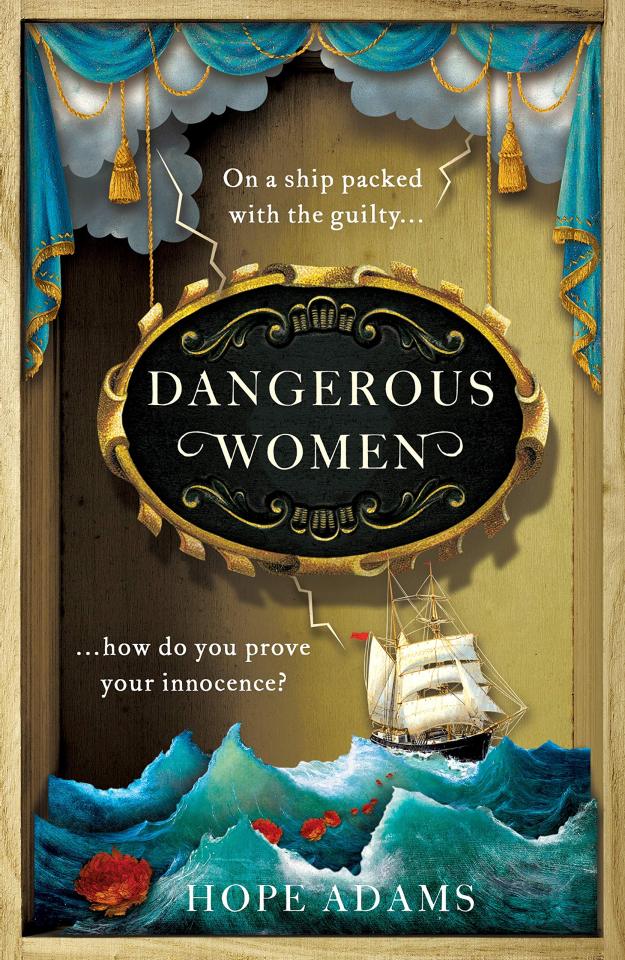
In 1841, 180 English women are on board The Rajah, a ship bound for Australia. All of them are criminals, most of them convicted of petty crimes but one of them has a deadly dark secret. Then someone is killed and the hunt for the culprit is on. But it’s hard to protest your innocence when you’ve already been found guilty. This addictive mystery is so well-researched and is based on the true stories of real female criminals aboard The Rajah. There is an overwhelming, stifling darkness, haunting the whole novel that is so atmospheric and reflective of conditions on board. It’s a story of sisterhood, female friendship and the existence of the Rajah Quilt is an example of the incredible feats that women can overcome if they work together.
2. Moxie by Jennifer Mathieu.
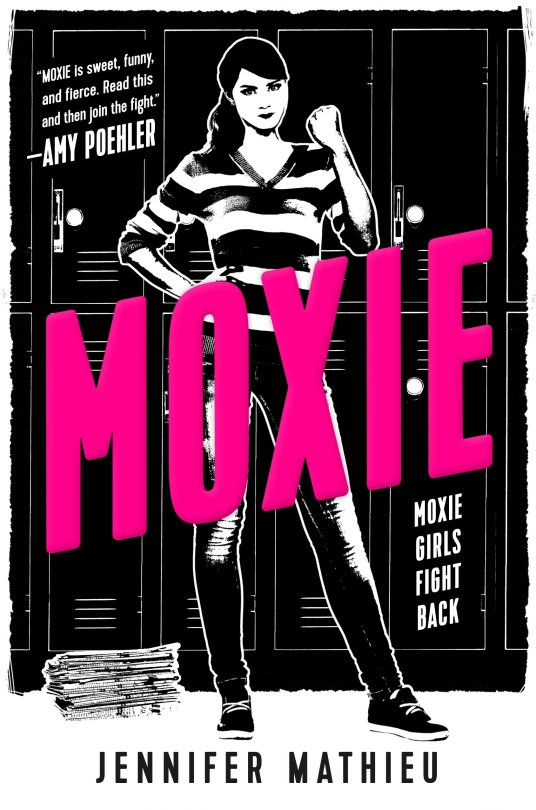
Viv is tired of following the rules at her high school and is determined to shake things up. Channelling her mum’s former punk persona, Viv creates and secretly distributes a feminist zine to her classmates, who start to take action. Cliques are abandoned as new friendships are formed and a revolution kicks off. The real sweetness about this gutsy, fierce YA novel is the fact that talking about the daily trials and tribulations that girls go through brings them together rather than divides them. There are some fantastic characters and the inclusion of male allies is everything.
3. Queenie by Candice Carty-Williams.
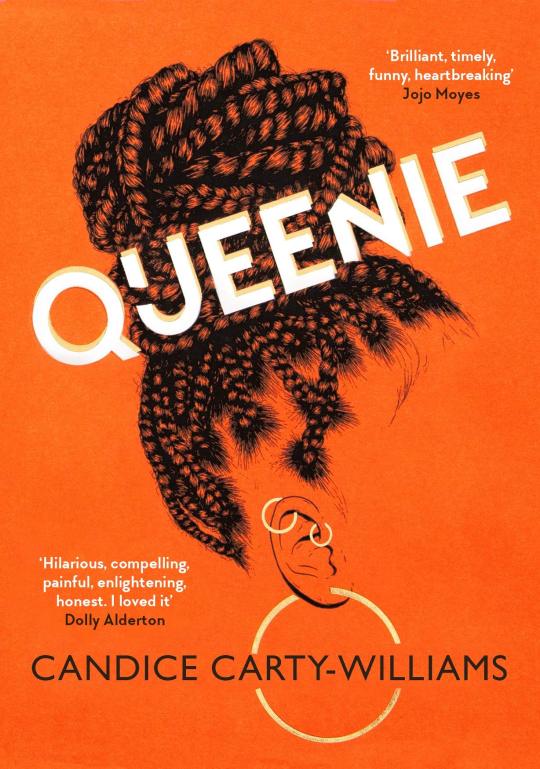
After a disastrous break up, British-Jamaican millennial Queenie embarks on a journey, riddled with bad choices, to discover what she really wants from life. Straddling two cultures, a job where she is perpetually underappreciated and an underlying mental health condition, Queenie is a relatable depiction of what it means to be a young, Black woman in 21st century London. Funny, honest and deeply moving, Queenie is an essential enlightening read with a wonderfully flawed, real woman at its heart.
4. Hag: Forgotten Folktales Retold.
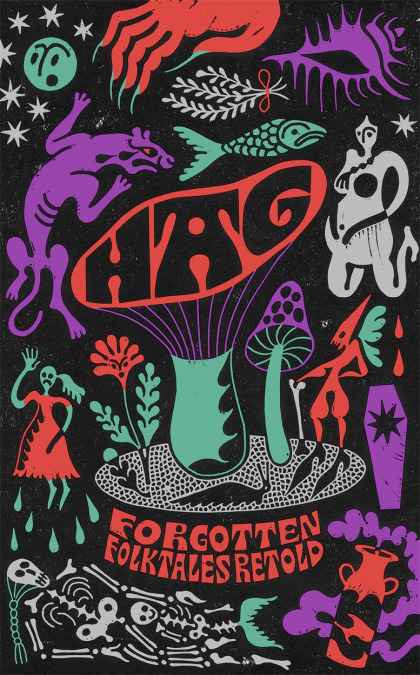
Inspired by British urban myths, this collection of spooky, fantastical stories by various female authors celebrates women in all of their guises. These stories are written by the likes of Daisy Johnson, Kirsty Logan, Irenosen Okojie, Eimear McBride and more. Some of the stories are very dark. Some of them offer powerful insights into other cultures. Some of them explore inherently female issues such as the repression of desire and motherhood. Overriding the whole collection is the wonder and power of women defying the odds and achieving their dreams. A fantastically unique read, ideal for International Women’s Day.
5. My Grandmother Asked Me To Tell You She’s Sorry by Fredrik Backman.
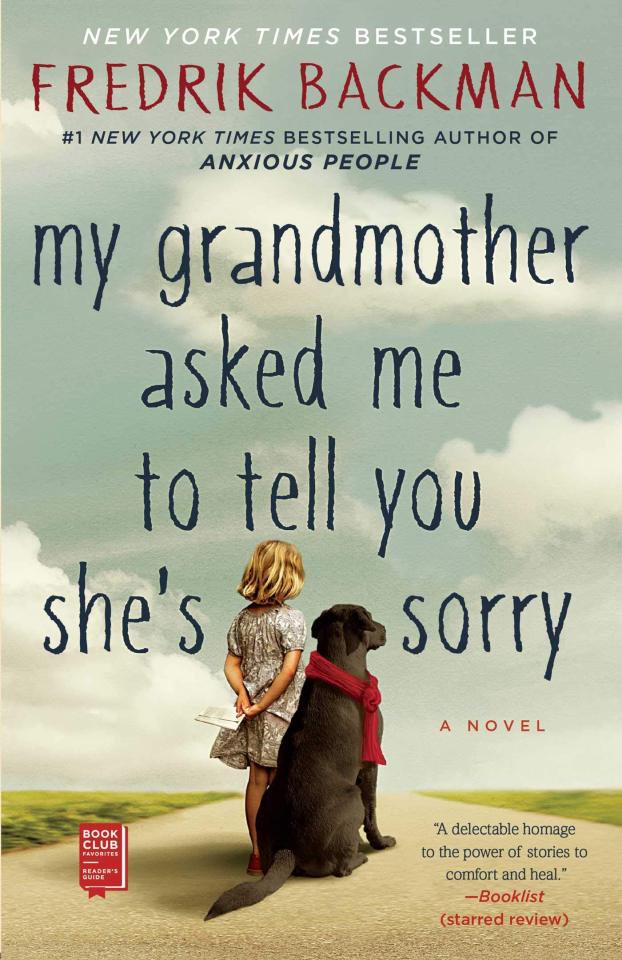
When Elsa’s grandmother dies, she discovers a series of letters apologising to the various people she has wronged. Elsa’s mission to deliver these letters leads to some strange places and a journey that leads to getting to know her grandmother in a way she never did, when she was alive. The relationship between seven-year-old Elsa and her grandmother is so beautiful and I’m sure I’ll never read another grandmother-granddaughter relationship like it. Granny is a truly formidable character and a woman who has left behind a very full, colourful life. Backman is a master at writing quirky, uplifting stories of community and this charming novel is no different.
6. Kim Jiyoung, Born 1982 by Cho Nam-Joo.
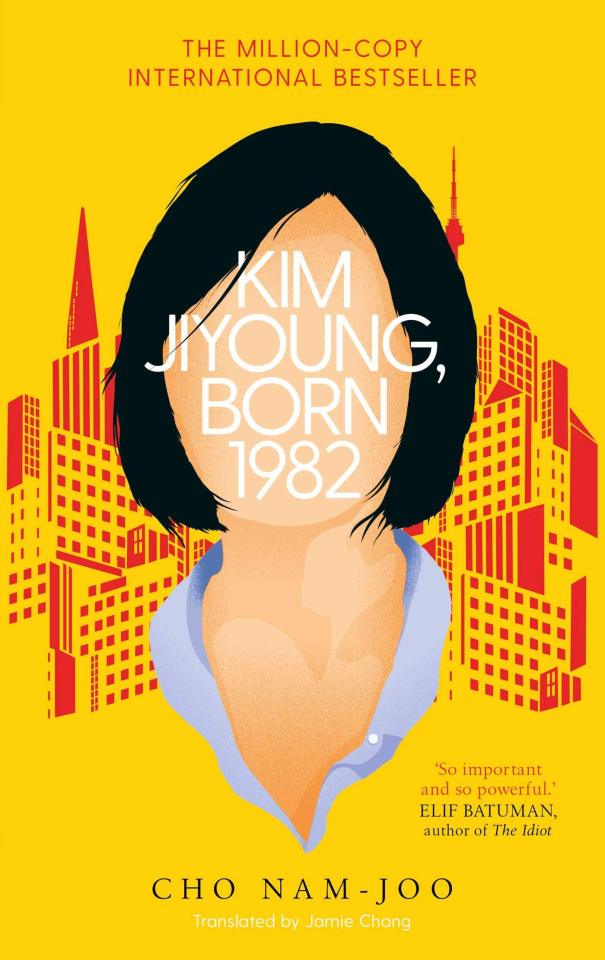
Kim Jiyoung has recently given up work to raise her baby daughter but before long, she begins displaying strange symptoms, such as impersonating the voices of other women. As her psychosis deepens, Jiyoung’s entire life is spilled to her male psychiatrist and it’s a life of restriction, abuse and control. This incredibly evocative book is a harrowing illustration of the misogyny ingrained deep in Korean culture and the devastating effects it can have on the women who live within it. A woman on the brink of insanity speaks for them all in this heavily symbolic, heartbreaking read.
7. The Shelf by Helly Acton.
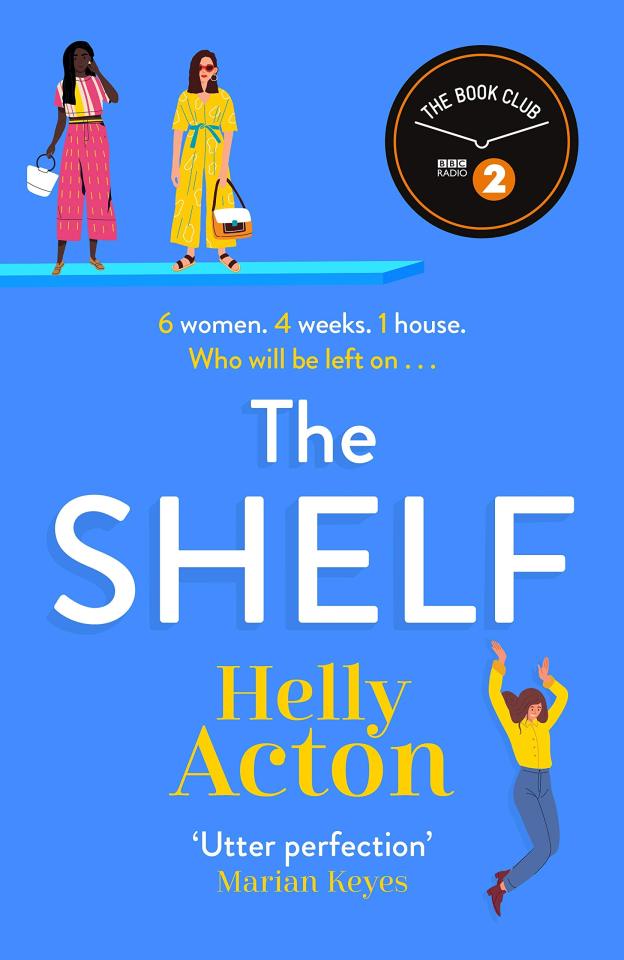
Amy is pretty sure that Jamie is about to propose, so she is more than shocked to find herself on The Shelf, a reality TV show for single women. Over the next few weeks, she and five other women must take on challenges to improve themselves and be crowned ‘The Keeper’. The Shelf is a joyful celebration of singledom and female friendship. Funny and heartwarming, it inspires its readers to never settle for second best and discover life and yourself, completely on your own terms.
8. Invisible Women by Caroline Criado-Perez.
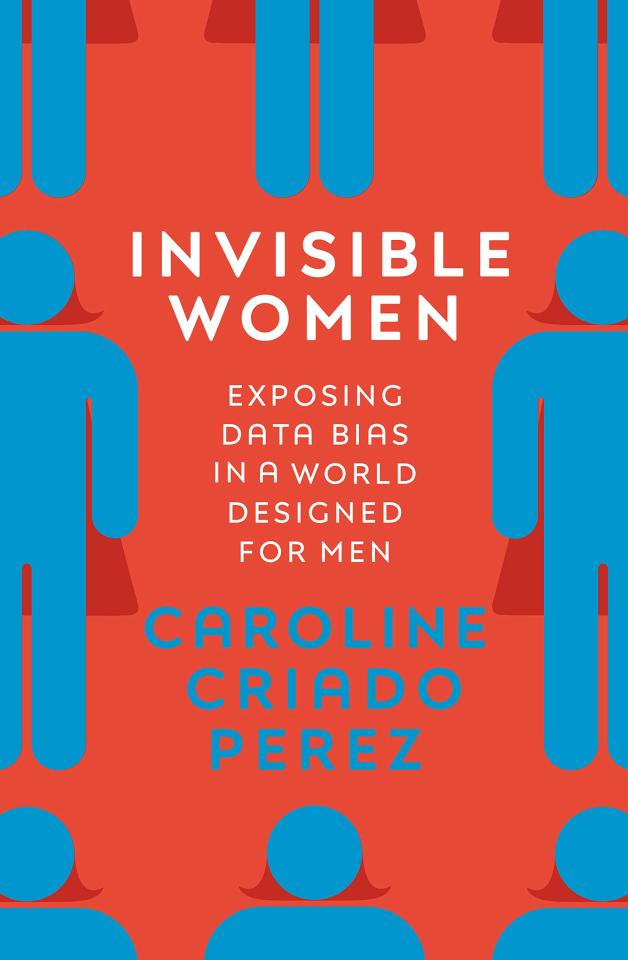
The world is made for men. Cars, phones, the medical industry, workplace laws and more areas of modern society largely ignore women. This fantastically informative manual exposes all the data biases that have been hidden from us. Caroline Criado-Perez has collated stories and case studies from across the globe that show how women’s lives and health are affected by our male-minded world and calls for drastic change.
9. A Kind of Spark by Elle McNicoll.
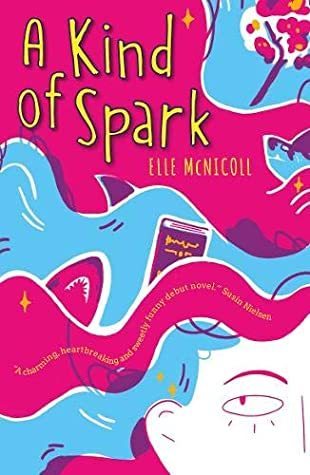
Addie has autism but she is so much more than that. When she learns of her hometown’s involvement in witch trials, she launches a campaign to erect a memorial for the women who died during them. This gorgeous, uplifting, funny middle-grade book offers a unique insight into a neurodivergent mind and simultaneously honours innocent, murdered women. You’ll get all the feels!
10. Olive by Emma Gannon.
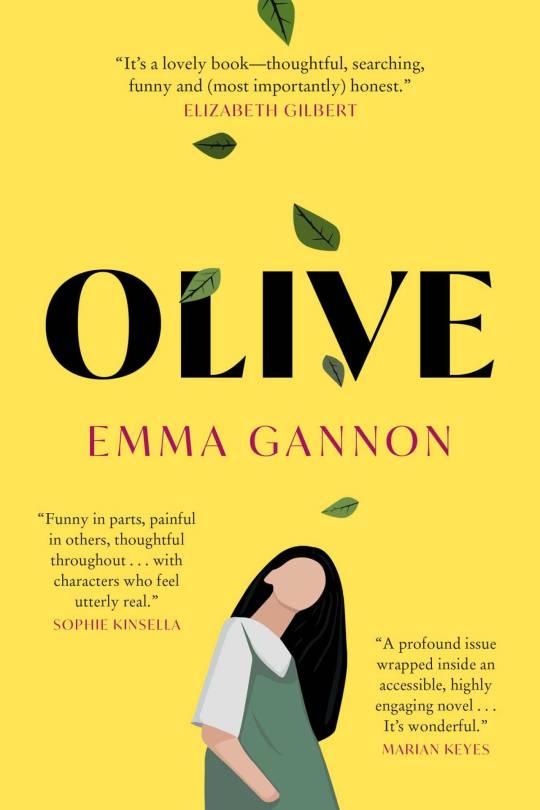
Olive’s choice to not be a mother has ended her nine year relationship and her three best friends are all at various stages of motherhood. So, where will Olive fit into their lives now? This wonderfully sensitive and thoughtful novel is a wonderful celebration of women who are child-free by choice as well as giving voice to those who have struggled to become mothers. It will speak to any woman who has ever been asked when they’re going to take the leap into that ‘inevitable’ stage of a female life -motherhood.
11. The Seven Husbands of Evelyn Hugo by Taylor Jenkins Reid.
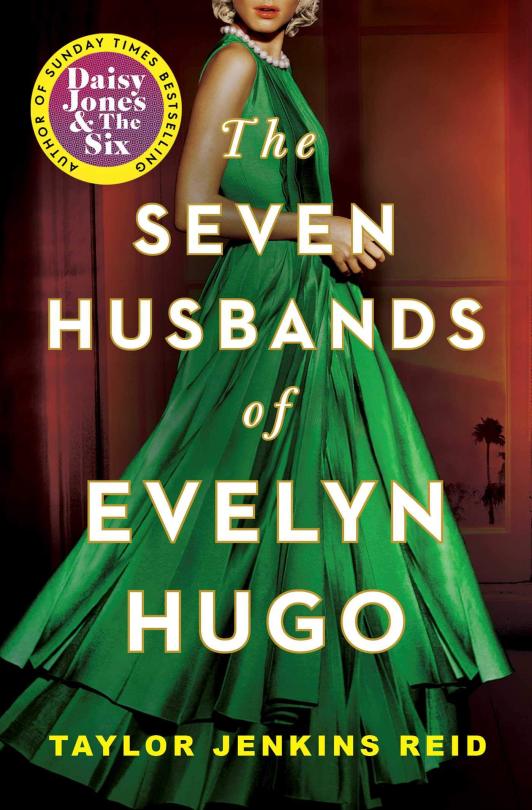
Evelyn Hugo is a retired Hollywood icon who has personally chosen struggling, unknown reporter Monique to dictate her biography to. No one knows why, not even Monique herself. Over a series of intimate meetings, Evelyn tells Monique her story; from her rise to fame in the 1950s LA to her retirement 30 years later and the myriad of romances throughout that time. In time, it becomes clear that Evelyn’s and Monique���s lives intertwine in a heartbreaking fashion. Soaring, epic and completely unforgettable, Evelyn Hugo is the story of a woman who was consistently objectified, moulded and suppressed. Ultimately, it is a story of a great forbidden love and the hell that fame can bring, especially for women.
12. The Year of the Witching by Alexis Henderson.
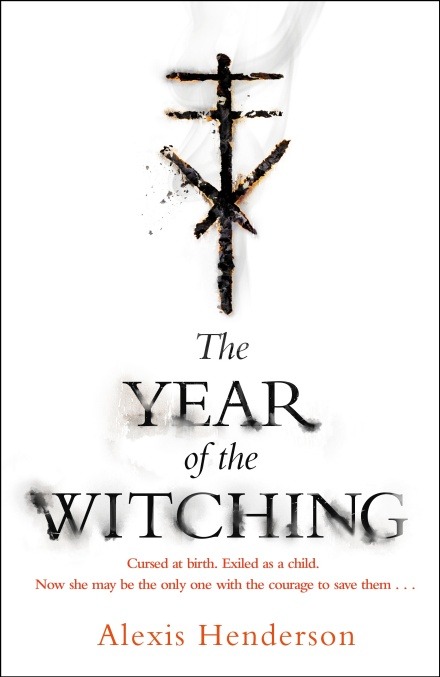
Imannuelle’s mixed heritage is sacrilege in the tiny, puritanical community in which she lives. So she does her best to obey the rules and worship the Father. However, she finds herself in the haunted Darkwood where the spirits of murdered witches roam but they have a gift for Immanuelle -her dead mother’s journal, which leads to her discovering the dark truths behind the community she was born into. This atmospheric, brooding fantasy-horror novel champions the overthrowing of control, the discovery of one’s own inner power and capabilities as well as demonstrating how women have been villified by the patriarchy for centuries, simply for leading the lives that they want to lead. An addictive, Gothic witchy treat!
30 notes
·
View notes
Text
God I am so sick of this narrative of “women listen to true crime podcasts to learn how to avoid being murdered”. The school newspaper here just published an editorial that insisted that that SHOULD be why you listen to them, and not for “entertainment” (it also discussed listening for education on the legal system and to help with ongoing local cases but the intro and conclusion focused on that main narrative). Have y’all considered that things can have educational value without having practical real-life applications? Sometimes learning about history or current events is just interesting. If that means it’s “entertainment” so be it but it’s not the same as “sensationalizing violence” or “being morbid”. And I learned from this article that in addition to “stay sexy don’t get murdered” we’ve also got “stay rude, stay weird, stay alive”. Do y’all HEAR yourselves? Do you not hear the VICTIM BLAMING??? How is “don’t get murdered” any different than “don’t get raped”? I guess every woman who’s ever been murdered just wasn’t sexy or weird enough, sucks for her! Guess what? Men will kill you for being rude to them or ignoring them. God this shit is fucking annoying. You aren’t magically protected from murder just bc you listen to a shitty podcast. like, i wish this was just a narrative pushed on women true crime fans from the outside but it’s not.
I for one, watch true crime docs/read true crime books (i’m not saying every true crime podcast is shitty, i just can’t listen to podcasts, and i def think a lot of them are shitty) because I like learning about cases being solved. Or why a case has remained unsolved. I like mystery and puzzles, and I like justice. And i absolutely care about the victims more than the killers. Now, the article i read poses the question of “how many victims can you name?” and the sad fact is i can’t remember that many names. but i’ve sure as hell learned about them. I just watched the best true crime doc ever, falling for a killer, about the t*d b*ndy case. It focused on his girlfriend and (essentially) stepdaughter, his victims, the women who were involved in solving the case, women law professors and gender studies professors, it talked about the cultural shifts that were happening at the time and how that interacted with the fear being caused by this killer. Tell me that didn’t have educational value despite the fact that i got no take aways on how not to get murdered. I mean, yeah, no shit i wouldn’t get in a strange man’s car but that doesn’t mean the women who were killed by him were stupid (and obviously not all of them got in his car necessarily, that’s just a tactic we know about from the women that survived. although the first survivor i don’t think got in his car but i can’t remember. i have a bad memory ok. i can’t tell you any more about the killers off the top of my head than i can about the victims, just bc i happen to know their names bc i’ve heard them more).
2 notes
·
View notes
Photo
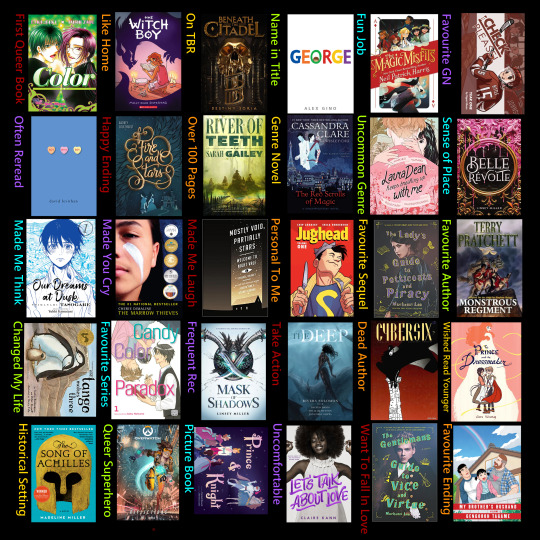
~ Queer Lit 30 Day Book Challenge ~
I decided to do this challenge I came across for June! Originally it was designed as a “day-by-day” thing, but my June was way too hectic to do a write up every single day… so I decided to make a nice compilation for the end of the month instead!
This is perhaps not the “purest” form of the challenge but I wanted it to be personal for me. Growing up when I did and where I did, I had very little exposure to queer books, especially age-appropriate queer books. That being said, there’s some books on this list that are really only “queer” by technically, or through a secondary character rather than the main character. I debated whether to include these but finally decided that, yes, I would. I owe it to myself. Even though some of these books that aren’t “as queer” as other, they were (or are) really important to me as a queer person and my journey is understanding that, so I wanted to acknowledge them!
More info about the books and the challenge under the cut!
Day One: First Queer Book You Remember Reading
Color by Taishi Zaou and Eiki Eiki
Remember how I mentioned a lack of available, age-appropriate queer books? I was one of those kids who was definitely exposed (probably too young) to queer manga/yaoi. It wasn’t necessarily what I wanted, especially as a wee ace teen, but it was the best I had at the time and it meant the world to me at the time, to see same-sex relationships even if looking back on them is very “YIKES”.
I’m sure I read others before this, but Color is one of the first that I really remember and which I a) actually owned and which b) wasn’t completely repellent in hindsight! I haven’t reread it in probably over a decade so I have no idea how it stands up, but at the time it read like a much more “realistic” account of two teenagers developing a crush and starting a relationship and as a questioning teenager it really helped me realize that this was a real, viable option.
Day Two: Queer Book That Reminds You Of Home
The Witch Boy by Molly Knox Ostertag
I hummed and hawed about this one for a long time because honestly I tend to read books that make me feel far from home. I decided to go with The Witch Boy though because it’s a story that challenges gender norms and stars a large family out in the woods, running wild and exploring magic, and honestly it gives me vibes that remind me of vacationing with my extended family. We’re also partially ginger and inclined to run wild in the woods. If we knew magic we’d have used it for sure.
This book is about 13 year old Aster, who lives in a family where the women all become witches and the men all become shifters. Aster, however, has no interest in shapeshifting and instead finds ways to study magic and learn the arts of witchcraft while constantly being pushed out by his female relatives… though everything might change when a new danger, that may or may not be connected to Aster studying magic, begins to appear.
Day Three: Queer Book That Has Been On Your TBR Too Long
Beneath The Citadel by Destiny Soria
That was an easy choice, this has been sitting on my bookshelf for months, staring at me accusingly every time I enter my room. I’m really excited to read it (Magical heist? Rebellion? With an asexual protagonist? Yes please) but for some reason I have not gotten around to it. Some day, baby, some day.
Day Four: Queer Book With A Name Or Number In The Title
George by Alex Gino
George is an absolutely charming middle grade novel about a child named George who the world perceives as male… but who knows she’s definitely a girl. The novel begins when her class decided to put on a play about the novel they had just read: Charlotte’s Web. George is desperate to play Charlotte, her favourite character, but isn’t even allowed to try out because it’s a “girl’s role”. George and her best friend struggle with how to handle this problem and manage George’s secret amid elementary school and home drama.
This book is really adorable – it was a nice, easy, cozy read for an adult, and would also make a great read aloud to elementary-age children if you want to introduce them to transgender characters.
Day Five: Queer Book Where The Protag Has A Fun Job
The Magic Misfits by Neil Patrick Harris
Not actually a queer protagnoist, but a queer side character who plays a major role in the series. Mister Vernon, one of Leila’s fathers, has arguable the coolest job: he’s a retired stage magician turn magic shop owner, which is complete with large rabbit, hidden room, and tons of fascinating gadgets to help a young practical magician learn their trade. He is hands down one of the neatest character in the series and is a major catalyst throughout the series.
The first book follows Carter, a runaway orphan who practices street magic to get by, as he runs away from his horrible uncle and winds up meeting a gang of magic-loving friends in a small town. Hiding from his uncle is only the beginning though, and the mysteries surrounding the town and Mister Vernon become thicker and thicker as the series goes on.
Day Six: Favourite Queer Graphic Novel
Check, Please! by Ngozi Ukazu
There’s lots of fantastic queer graphic novels out there, but I have to name Check, Please! as my favourite (and not just because I’m Canadian and am legally obligated to at least show interest in a hockey story). Check, Please! is the friggin cutest story about Eric “Bitty” Bittle, former figure skater and avid baker, who joins the Samwell University hockey team. The story is told in the form of Bitty’s vlog as he recounts the bizarre quirks of the Samwell hockey team, his struggle to overcome his fear of checking, and his growing crush on the team captain, Jack. Seriously guys, this is cavity-inducing sweetness and you can read it all online for free, here on tumblr @omgcheckplease or at its own website, checkpleasecomic.
Day Seven: Queer Book You Often Reread
Boy Meets Boy by David Levithan
Another book I haven’t reread in years, but this was the first queer novel I ever read (and owned!) so I read it obsessively, first the copy from the high school library and then my own copy (which is, let us say, well-thumbed by this point). It was pure fluff, in an aggressively diverse, relentlessly accepting, rainbow-coloured high school and it was exactly what I wanted in high school, and it still makes me happy whenever I remember it. It’s a straight-up high school romance, pretty traditional to the genre, but it has the most delightful supporting cast you could ever ask for. Maybe I should reread it again this summer…
Day Eight: Queer Book With A Happy Ending
Of Fire and Stars by Audrey Coulthurst
This was a bit more of a “yeah it was fine” book for me, but honestly… queer people deserve some average, run-of-the-mill YA fantasies. As far as my normal reading preferences go, run-of-the-mill YA fantasies are my bread and butter. And this one has a cute sapphic romance to go with it. It’s about Denna, a princess with a dangerous secret: she has a magical Affinity for fire, despite being betrothed to the prince of a kingdom that aggressively prosecutes and fears magic-users. So now Denna is in a strange land, trying to hide her increasingly volatile magic, solve an assassination that rocked the kingdom, and deal with the growing connection between her and the prince’s wild sister, Mare. It has court intrigue, a murder mystery, horses, and lots of confused sapphic pining so it’s totally worth picking up if you want a light summer fantasy adventure.
Day Nine: Queer Book With (Over) 100 Pages
River of Teeth by Sarah Gailey
I decided to try to get as close to 100 pages as possible! River of Teeth is a 114-page novella that I haven’t quite finished (work and covid stress happened) but which I am fucking losing my mind for. I can’t recommend it enough. It’s peak alternative history, about queer hippopotamus-riding cowboys in Louisiana during the early 20th (late 19th?) century. Like… I don’t know how to emphasize how unbelievably cool this book is. Genderqueer demolition expert with a giant crush and a penance for making things blow up and attempting to poison guests when they’re bored?? Check. Gay gunslinging hippo-riding cowboy with an angsty backstory (and also a giant crush)? Check. Sexy, fat, badass lady con artist with an albino hippo that she spoils? Check. Like damn guys. I’m not done the book and I’ve already bought the sequel because I know the second I pick it back up I’m not gonna stop until I’ve ploughed through it all. This book is the epitome of “refuge in audacity” and “rule of cool”. Is it over the fucking top? Absolutely but that’s the point.
Day Ten: Favourite Queer Genre Novel
The Red Scrolls of Magic by Cassandra Clare
I’ll be honest, I’m a little shaky on what counts as a genre novel (isn’t… everything… a genre??) so I decided to interpret it as “slightly trashy YA supernatural fantasy” because that sure is a hella specific genre I’m weak for.
I really thought I was done with the Shadowhunter novels, I thought they were a goofy series I left behind in teenagerhood that I could look back on with amused indulgence. And then I found out that there was a novel specifically about Alec and Magnus and! Oh no! Ding dong I was wrong. I fell back in hard because listen… I love them. They were one of the first canonical same-sex relationships I ever read about in an actual novel, they meant a lot to me then and still mean a lot to me now. I have nothing to say to defend myself here except that this book wrecked me and I can’t wait for the sequel.
Day Eleven: Queer Book You Love In A Genre You Don’t Read
Laura Dean Keeps Breaking Up With Me by Mariko Tamaki and Rosemary Valero-O’Connel
I am very rarely a slice-of-life / romance genre sort of person. I like my stories cut with a heavy dose of fantasy, scifi, action-adventure… something. So a graphic novel that’s not only a romance, but one about an unhealthy relationship and infidelity is like… super outside my usual range of reading material. But it was very much worth the read! The art was stunning, and the complicated emotions it tapped into really touched me. I’m very happy to have read it, and was so damn satisfied by the end.
Day Twelve: Queer Book With A Strong Sense Of Place
Belle Révolte by Linsey Miller
Linsey Miller is one author I very actively follow, I love her works and they always have very distinct, complicated worlds with unique societies and magic systems. Belle Révolte was her latest book and followed a prince-and-the-pauper type of story, in which wealthy Emilie des Marais is determined to learn noonday (magical) arts in order to become a physician, someone who can actually work to make her home a better place… but this is not something a proper lady would ever be allowed to do. So she flees her finishing school and meets poor, but magically gifted, Annette Boucher and offers her the chance to switch places. Annette goes back to school as “Emilie” and gets to hone her skills at the midnight arts while Emilie will use her name to sneak into medical school and fight her way up the ranks to physician. This is a challenging enough task, with rebellion roiling just beneath the surface and the country about to slip into a arrogant war that threatens the lives of hundreds…
Day Thirteen: Queer Book That Really Made You Think
Our Dreams At Dusk by Yuhki Kamatani
This is a four book manga series that is completely breath-taking. It’s touched by magical-realism and completely drowned in visually stunning metaphors and symbolism. Seriously, I’ve reread these books multiples times trying to digest how the wide variety of symbols overlap and contradict and compliment and challenge each other. I still haven’t really gotten a solid handle on it, it’s very fluid, so yeah… definitely makes me think.
The story starts with Tasuku Kaname who believes he may have just been outed as gay by a high school friend, and feels like he’s watching his entire world crumble around him. He is seriously considering taking his own life, when he runs into the mysterious woman “Someone-san” and winds up leading him to a drop-in center that’s run by a local non-profit, and is also a hub for a number of queer people in the community. The books follow Tasuku as he grows, learns, makes mistakes, and confronts his feelings, along with a number of other members at the drop-in center. It is completely beautiful, optimistic, but also quite stark and harsh at its look at homophobia and transphobia in modern Japanese society and how it can effect people in different ways. I just bought book four and can’t wait to read it and see how everything ends.
Day Fourteen: Queer Book That Made You Cry
The Marrow Thieves by Cherie Dimaline
Holy shit guys. Listen. Listen. If you don’t read any other book on this list, please consider reading The Marrow Thieves. It is hands down the best book I’ve read so far this year. Another book that doesn’t have a queer character as the protag, but as one of the main supporting characters and listen, his story fucking destroyed me as a person. That romance just… aaaaaaah. AAAAAAAAH.
Anyway. The Marrow Thieves is a Canadian dystopian novel. It takes place in a post-climate change world in which society has been ravaged – partially due to the wildly different and extreme weather patterns, but also through a strange disease that has spread through the population that has left people completely incapable of dreaming. Now unable to rest, process their lives, and dream of a future, people are being driven insane and only one group appears to be immune: North America’s First Nations people appear to be unaffected. And so they begin to be harvested, rounded up and collected in “school” in order for people to suck the marrow out of them to give to white people afflicted by this disease. The Marrow Thieves follows a First Nations boy named Frenchie as he flees the recruiters and tries his best to survive in this post-apocalyptic like wilderness, banding together with other First Nations people who are heading north, where they hope to find communities of their own people with whom they can shelter and start to rebuild their lives.
It’s a YA level novel, not very long, and such an insanely good read. I cannot emphasize enough PLEASE GO READ THIS BOOK.
Day Fifteen: Queer Book That Made You LOL
Mostly Void, Partially Stars by Joseph Fink and Jeffrey Cranor
Welcome to Nightvale always makes me laugh and it was a lot of fun to get to read the transcripts of the episodes. I’m a sucker for novelizations/transcripts of shows. It was a nice nostalgia trip and gave me an excuse to go back and relisten to some of my favourite episodes too! If you’ve never gotten into Nightvale… hey, it’s a classic! Podcast is fucking stunning if you’re into podcasts, and if you’re not but would enjoy a weird, queer, eldritch horror comedy then try the book! It’s the first “season” compiled in text form, exactly how it’s heard in the show.
Day Sixteen: Queer Book That Is Really Personal To You
Jughead volume 1 by Chip Zdarsky et al
Including this one because gee golly it sure did make me want to fight a lot of people for quite a while. It was one of the first stories I ever found/read that had an explicitly asexual main character… (and a character I already really loved! Which I now got to feel an even stronger connection to! It was so fun and validating!) so it was super awesome how like half of tumblr decided for a year there that this was apparently a cardinal sin. Imagine… one single version of old, long standing comic series deciding to retcon a character to represent a heavily under-represented community… imagine being so fucking angry about that that you decide to start a hate campaign on the internet. So much fun to live through that as an ace person. Anyway, these comics were nothing amazing but I sure do love them aggressively out of pure spite, even now that the aphobia on tumblr has died back down I will hold this to my chest and adore it.
Day Seventeen: Favourite Queer Book Sequel or Spin Off
The Lady’s Guide to Petticoats and Piracy by Mackenzi Lee
Honestly do I even need to say anything here? Is there any queer person who hasn’t read Mackenzi Lee’s The Gentleman’s Guide to Vice and Virtue series? If you are someone who hasn’t read it yet… go do that?? Absolutely stunning, one of my all-time favourite book series. It’s the perfect combination of hilarious and goofy, intense action, heartfelt character development, and a dash of “wait was that supernatural or??” This sequel was fantastic, this time focusing on Felicity, Monty’s sister, and her quest to become a physician despite being a woman in the 18th century. Awesome look at femininity, feminism, asexuality, and race. (Also… OT3? OT3.)
Day Eighteen: Favourite Queer Book By A Favourite Author
Monstrous Regiment by Terry Pratchett
One of those “ehh is this technically queer? Not really but close enough, it is in my heart” books. It was one of the books I read as a teenager when I was still beginning to seek out and try to explore queer lit in so much as I could.
Terry Pratchett is, hands down, my favourite author, and though he doesn’t tend to write explicitly queer literature, his exploration of gender through allegory is top fucking tier. Everything to do with the dwarves in his series is fascinating, and a really great challenge/critique/exploration of gender, and this is the book that takes it to the next level (and brings in at least implicitly queer characters). It’s about Polly Perks, who lives in a small, war torn nation, choosing to join the army in order to find out what happened to her brother. However, as tradition dictates, she can’t join as a girl… so she disguises herself as Ozzer, a young man. There’s a lot of twists and turns, and as always Pratchett delivers fantastic humour and just absolutely delicious satire.
Day Nineteen: Queer Book That Changed Your Life
And Tango Makes Three by Justin Richardson
This was the book that made me realize that I, as a queer teacher, could have queer kid lit in my future classroom. Maybe a comparatively small revelation, but a really important one to me. It made me realize that this didn’t need to be something I kept a secret in my professional life and which could really positively influence children, especially queer children. It was the first queer children’s book I ever bought.
Day Twenty: Favourite Queer Book Series
Candy Color Paradox by Isaku Natsume
Alright… I’ll admit it, this isn’t actually my favourite series, but I’ve used my favourites in other spots. And this is a good one! Definitely more of an actual “yaoi” than the other manga I’ve included (here there be sex) but it has a very different vibe that what I’m used to from that type of manga. The main pair are actually both capable, mature adults, with careers they actively care about, and who get together in the first volume!
The rest of the series is less about them angst-ily toeing around their relationship, and much more about them learning to grow as a couple and balance their work and relationship and society. It’s funny and sweet, and I really enjoy these two losers. It’s a very low-stakes enemy-to-friends-to-lovers story, in which Onoe (a reporter) and Kaburagi (a photographer) are paired up on a news story they’re supposed to dig into together. What starts as a bickering rivalry gradually becomes respect, friendship, and love~ Onoe is a gremlin of a protag, so he’s a treat to follow.
Day Twenty-One: Queer Book That You Recommend A Lot
Mask of Shadows by Linsey Miller
To repeat myself: Linsey Miller is awesome! This is my favourite book of hers, the first of a duology. It’s kind of like an intense, edgy Tamora Pierce novel with murder. In this world, the Queen has a team of assassins known as the Left Hand. They’re an elite group that keeps the Queen safe and does the dirty work that needs to be done to protect the kingdom and keep the encroaching nations at bay. When the assassin Opal is killed, a contest is announced to find the new Opal. People from all over come to complete for the honour of being one of the Queen’s royal assassins, including gender-fluid thief Sallot Leon. Sal has some deep motivations to become Opal that go beyond a loyalty to their kingdom, but they’re going to have to survive their competitors if they even wants a chance at it… (Sal generally goes by either she or he in the books, but I’m using they in this instance since it’s in a more general sense.)
Day Twenty-Two: Queer Book That Made You Take Action
The Deep by Rivers Solomon
Uhh, I don’t really have any books that made me take action per se, but this one sure gave me a lot to think about. It’s about deep sea mermaids who originated from the pregnant slave women tossed into the ocean to drown during passage to North America. From those dying women, this race was born and were taken in by whales, raised and protected until they could descend into the deep ocean waters, to form their own safe society. Their collective past is so painful though that as a species they’ve developed a very short term memory. But a people can’t live without any ties to their roots and so one of them, the Historian, holds all the memories for their entire species and shares it with everyone once a year so that the community can be connected to their ancestors before once again returning the memories to the Historian for safe keeping. Yetu, the current Historian, is so overwhelmed by these memories, that she can no longer take it – she flees her people, her responsibilities, and her pain and escapes to the surface instead...
Day Twenty-Three: Queer Book By An Author Who I Killed Is Dead
Cybersix by Carlos Trillo
I cannot emphasize enough, this is not actually a queer comic, it is in fact a very homophobic, transphobic and sexist comic written by a horrible person.
That being said, he’s dead and I own it now the TV series was essentially about a genderqueer superhero and a very confused bi biology professor who has a crush on both personas. I had a passionate crush on both personas as a child, and I will cherrypick this comic until I die in order to enjoy the only kickass genderqueer/genderfluid noir antihero I’ve come across. I am valid and I am not open to debate or discussion. Do not read this comic it’s horrible (but consider watching the show).
Day Twenty-Four: Queer Book You Wish You’d Read When Younger
The Prince and the Dressmaker by Jen Wang
This is such an incredibly soft story with the nicest art. There’s so much understanding and compassion in it and its exploration of gender and self-confidence and being true to yourself would have been very reassuring to me as a child, especially by late elementary/middle school.
Day Twenty-Five: Queer Book In A Historical Setting
The Song of Achilles by Madeline Miller
A retelling of Achilles’ and Patroclus’ relationship from childhood to the Trojan war. So yeah, you can imagine that this was also a candidate for Day 14 :’) I haven’t read this one in years but god it was lovely and emotionally destroyed me as a person.
Day Twenty-Six: Queer Superhero Book or Comic
Overwatch: Reflections by Michael Chu and Miki Montillo
I don’t really read superhero stories very often (the comics have always driven me a little bonkers, trying to find a way to enter the totally unapproachable Marvel/DC canons, and the MCU burnt me out years ago for every other sort of superhero story) so this is the closest I can get. Tracer’s a superhero yeah? Anyway, I, like every other queer person in the Overwatch fandom, lost my fucking mind when this dropped for Christmas a few years back and officially declared Lena Oxton not only the face of the entire franchise but also a lesbian. It’s an adorable little comic and Tracer’s girlfriend is a sweetheart.
Day Twenty-Seven: Favourite Queer Children’s Picture Book
Prince & Knight by Daniel Haack
There’s a number of sweet queer children’s books that are popping up these days, but this is my favourite just because it’s less about “explaining the gays to children” (though those books also have their place) and more of a cute little fantasy adventure in which the actual protagonist is gay. It’s about a prince who sets out to find himself a bride who can help rule by his side, but it quickly becomes clear that he isn’t interested in any of the girls. Instead, when a fire breathing dragon threatens his kingdom, he meets a brave knight who fights along side him. It’s very supportive and the art is lovely.
Day Twenty-Eight: Queer Book That Made You Feel Uncomfortable
Let’s Talk About Love by Claire Kann
This is a book with an asexual protagonist that I was originally really excited for. I know there are a lot of people out there who really enjoy this book and connected with it, but it didn’t do it for me. Maybe because my expectations were too high, but the protagonist’s experience with asexuality was vastly different than my own and the narrative voice ended up rubbing me wrong (and let’s be honest, slice-of-life romance is NOT my usual genre at all). So it’s not “made me uncomfortable because it’s Bad And Wrong” more just… totally vibed wrong with me. Maybe the perfect book for other people but definitely not for me, I had to return this one unfinished because it’s portrayal of asexuality just made me so deeply uncomfortable.
Day Twenty-Nine: Queer Book That Made You Want To Fall In Love
The Gentleman’s Guide To Vice And Virtue by Mackenzi Lee
This book had to make it on here somewhere, and honestly it could have gone in a lot of different spots, but I chose to put it here because the relationship between Monty and Percy is so incredibly sweet and authentic it really does make you want something like that. TGGTVAV (for anyone who has somehow not heard of it) takes place in the 18th century, and is about Monty, his best friend (and crush) Percy, and his sister Felicity going on a final “hurrah” tour of Europe before Monty's father finally tries to pin him down in England and force every part of Monty that’s deemed “unacceptable” out of him. So Monty intends to live this summer up… until everything goes off the rail and the three of them are suddenly fleeing across the continent with assassins at their heels and a strange, stolen artifact in their possession.
Monty has a lot of growing to do in this novel, and that’s one of my favourite things about it. For his and Percy’s relationship to ever have a chance, Monty needs to learn and change and actually communicate with other people, and it makes the relationship feel strong. Not a fluffy, surface level romance that often happens in YA but something built from the ground up by two friends who really want to make it work. Ahh, it’s lovely. One of my favourite novels.
Day Thirty: Queer Book With Your Favourite Ending
My Brother’s Husband by Gengoroh Tagame
A two-book manga series that was completely stunning. It deals with queer relationships and homophobia in a very stark, real-world manner that you don’t often get in manga, while still being incredibly loving and sympathetic. The book is about Yaichi, a single father whose estranged brother (Ryoji) recently died. One day, a Canadian named Mike arrives, introducing himself as Ryoji’s widower. Mike had come hoping to visit his late husband’s homeland to try to get some closure, and Yaichi ends up inviting Mike to stay. The whole story looks Japan’s societal biases, through Mike’s experiences, Yaichi’s thoughts, feelings and prejudices, and those of his daughter who adores Mike.
Seriously, this is one of the kindest, most earnest looks I’ve ever seen to internal prejudices that critiques them without demonizing the person who feels them. Instead it lovingly embraces grief, growth, and love. This series made me cry multiple times, was good enough that even my straight brother practically ordered me to go out and buy the second book when he finished the first, and the ending was just *chef’s kiss*
Honourable Mentions
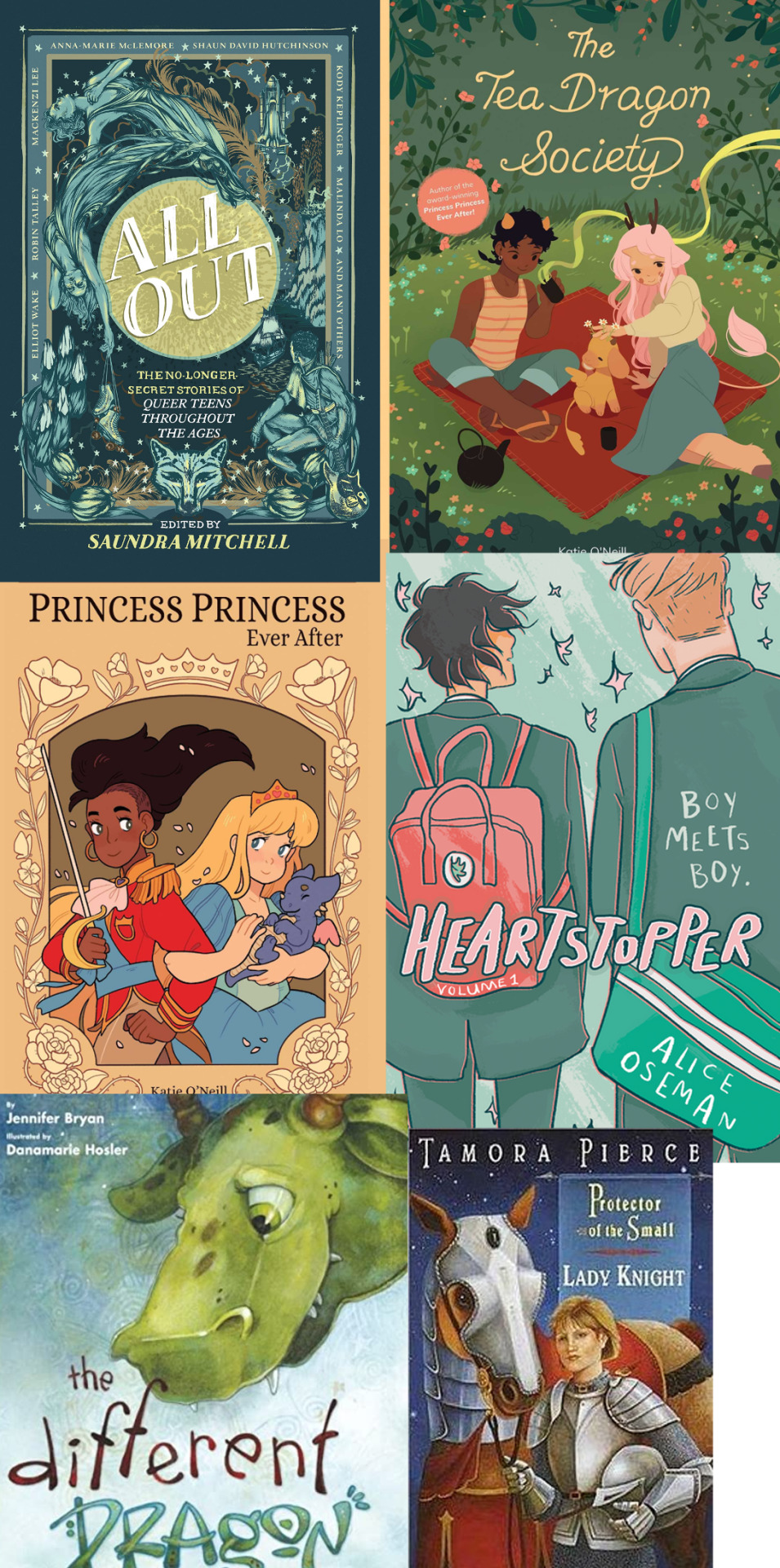
A few books I really wanted to fit on my list somehow but couldn’t quite manage it, so here: All Out an anthology of historical fiction short stories about queer teens. The Tea Dragon Society series and Princess Princess Ever After, graphic novels by the amazingly talented Katie O’Neill. Heartstopper a webcomic turn graphic novel by Alice Oseman about a pair of rugby players. The Different Dragon a cute picture book in which the boy has two moms and which is about accepting different ways of being. And Lady Knight a part of Tamora Pierce’s Protector of the Small series because because Kel is word-of-god aro(and/or ace) and I’ve adored that series and Kel since I was about thirteen so by god I’ll take it.
-
Now for those that wanted to do their own challenge, I found it on @gailcarriger’s blog.
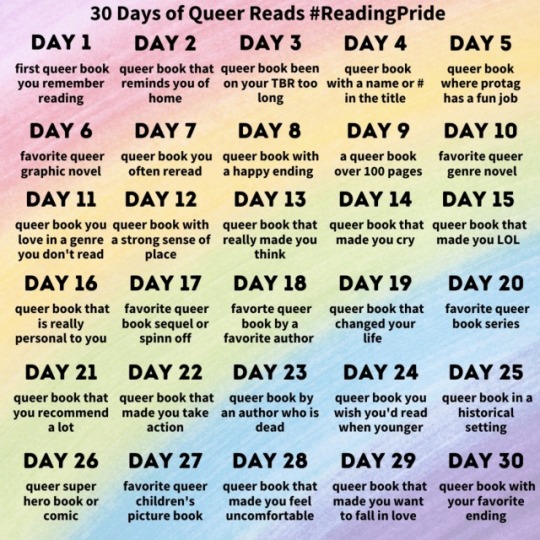
#queer lit#queer literature#queer books#pride books#pride 2020#book review#book reviews#lgbt literature#lgbt books#tggtvav#tlgtpap#mask of shadows#belle revolte#jughead#check please#shadowhunters#our dreams at dusk#my brother's husband#manga#witch boy#wtnv#the marrow thieves#canadian lit#canadian literature#river of teeth#the prince and the dressmaker#and tango makes three#the deep#song of achilles#idk and others i guess
57 notes
·
View notes
Photo

A/N: For the Bnha LBGTQ+ zine! Thank you for being an inclusive zine. 😊 I wanted to do some queer exploration for Nejire, grappling with confusion as she grows before accepting who she is.
…
…
…
…
“Kiss,” Nejire read aloud, her chubby fingers tracing the word in the picture book. Seated in her mother’s lap, she leaned closer to the book, eyes wide as she observed the image of a prince leaning down to kiss the princess.
“You read it right,” her mother praised, beaming brightly. “The prince kisses the princess, breaking the curse.”
Nejire glanced up at her mom, then at the book she was patiently holding open. “Kiss,” she repeated. “Mommy, what’s it taste like?”
“Taste?” Her mother laughed, surprised. She hummed lightly. “Now that’s a question…what does it taste like? What’s your most favourite thing in the whole world?”
Nejire snorted. That was easy. “Candy,” she replied immediately.
“I should have guessed.” Letting go of the book with a hand, her mother tousled Nejire’s hair affectionately. “Then that’s what a kiss tastes like.”
-x-
Her first kiss tasted like cotton candy. In the shadows behind her school, Nejire clumsy kissed her classmate and tasted the chapstick on her lips. In retrospect, it was a clumsy kiss, filled with fumbling hands, bumping noses, and clacking teeth. At the moment, though, Nejire noticed none of that. Her heart beat fast as she gripped Tohru’s shoulders. Her face, her hands, her everything was warm, almost hot, and she tried to remember how to breathe as their lips pressed one another.
Tohru had the prettiest long, brown hair, and Nejire had spent hours fantasizing running her hands through it. Doing it now, her fingers felt awkward and sticky, like she would tear out her hair before her hand managed to comb through it all. The tips of her other hand brushed against Tohru’s neck, against the soft skin there. She was too nervous to raise them higher, to rest her palm on Tohru’s cheek.
Breathless, they finally broke apart. Nejire panted as she tried to steady herself. A bright-red Tohru slumped onto her knees, chest heaving as she looked everywhere but at Nejire.
It was cute. Terribly cute. Nejire slowly crouched down till they were at same height again and smiled. “Want to do it again?”
Tohru squeaked.
-x-
Her second kiss was the sharp sting of a slap. Nejire reeled backwards, automatically clutching her cheek as she backed away from her classmate, Arisa. Unfortunately, in their eight-grade classroom, there was nowhere to go. Desks penned her in from her sides and behind her, Minako stood, her smile dark and malicious.
It was afterschool. Her teacher and other classmates were all long gone, the classroom empty save for her and five girls. One in front, one behind; Nejire looked at her right, glancing at the remaining three as she hoped for help. None of them said anything. Arms crossed, identical glares on their faces, they might as well have been mannequins for the support they offered.
Arisa shook her hand, wincing. “Damn, that hurt.”
Nejire gritted her teeth. Fine, she could handle this herself. She growled, “What was that for?”
“It was to wake you up,” Arisa replied, rolling her eyes. Not even paying attention to her anymore, she massaged her hand. “I should have just tossed water on you and been done with it.”
“To wake me up?” Nejire frowned, perplexed. “The hell, I am awake.”
“Clearly you’re not,” Minako snorted inelegantly. She stomped her foot on the ground. “You shouldn’t have done that.”
“Done what?” More and more, she wondered if something was wrong with her hearing, if she had swapped bodies or timelines and didn’t know it.
“You’re going to make me say it, aren’t you?” Arisa grimaced, her nose scrunching and brow furrowing. “You kissed Tohru.”
Nejire looked at Arisa, and then at Minako. “Yeah?” She rubbed her ears, maybe she really did need to get her hearing checked. “What’s wrong with that?”
“Whats…” Flabbergasted, Arisa stared at her for a long moment before massaging her forehead. “Are you serious?”
“It’s unnatural!” Minako interrupted, obviously ready for this to be over. “You kissed a girl. You’re not supposed to do that.”
“Why?” Nejire stepped toward Arisa and tried not to feel hurt when she stepped away. “Why not?”
“I can’t believe we have to start there—no wonder your grades suck. Just like your Quirk.” Arisa laughed and as if on cue, the other girls chimed in. In the small room, their laughter surrounded Nejire, swirling around her as though it were alive. “Tohru’s a girl, you’re a girl. You’re supposed to kiss boys.”
“But—”
“No buts. You’re not that stupid, are you?” Arisa flipped her hair over her shoulder and strolled away. “Don’t worry, we talked to Tohru about this.”
When Tohru stopped talking to her the next day, it felt worse than the slap.
-x-
Her third kiss tasted like peppermint, strong and sharp. Hidden in the trees by the playground, Nejire grabbed Hiro and kissed him. Just like with Tohru, she had to take the first step. Unlike with Tohru, there wasn’t any chapstick to taste, just the overbearing taste of peppermint, of a breath spray used a few too many times.
It was strange. Really strange. Nejire opened her eyes, studying the boy in front of her. His hands rested nervously on her hips, his eyes squeezed shut. Part of her liked this overly worried boy, this boy who gave her the shyest of smiles. His voice had shook when he’d confessed to her.
Would she have liked him if Tohru hadn’t stopped talking to her? It was a question without an answer. His lips were rougher than Tohru’s but the kiss was just as clumsy, just as awkward. Their faces fit together, somehow, but Nejire hadn’t figured out the placement just yet. Her skin burned, just like it had with Tohru’s, and her hands buried into his soft, dark tufts of hair. This time, her fingers didn’t get stuck in the short, curly locks.
She felt the same rise of excitement, the same heat running through her spine and curling her toes. The thrill was the same, whether it was Tohru or Hiro she kissed. The thrill was the same, the joy was the same, and why did one get her attacked and the other ignored?
It didn’t make any sense.
-x-
Her fourth to twelfth kisses were done secretly. Ever since that afternoon in the classroom, Nejire didn’t like getting caught with her crushes. In empty stairwells and locked classrooms, she tasted cherries and spearmint and the remnants of lunch on her peers’ lips. With each kiss, the taste grew more and more diluted, until all she could perceive was water.
Each kiss grew easier, more graceful. She learned how to place her nose, how to press her lips. Her hands threaded through hair like it was silk and her tongue shyly peeked out of her lips as she mastered the art of French kissing.
And when she grew weary of it all, she’d disappear into the library and quietly look up books on romance. Men saving damsels, women smiling at one another in coffee shops, two guys taking a ride to nowhere; she devoured each tale as though it were fact.
Lesbian. Gay. Bisexual. Nejire repeated each label, but none of them sounded right. None of them fit quite right. She poured through books on gender identities and sexual identities—if girls tasted of lip gloss and boys of breath spray, what did non-binaries taste of? Did she hate her clothes or her gender?
Whatever the answer, Arisa had been wrong. Utterly wrong. There was nothing strange about kissing a girl.
-x-
Her thirteenth kiss was a surprise. The moment she entered the Hero Academy, Nejire stopped thinking about kisses, about labels, about romance. There were too many new things to do, people to meet, and despite what her mother said, her kisses no longer tasted like candy. Besides, she had made two good friends in high school, two people whose quirks were just as bad as hers. Two people who were just as motivated to improve. They met up everyday after class, training in the yard until they had to crawl home from exhausted.
So, she hadn’t expected anything when she’d jogged behind Mirio, building up her stamina. Hadn’t thought of what would happen when she’d tripped over a rock, yelping as she fell.
“Nejire!” Mirio whirled around, his reflexes sharp as he reached out to grab her.
Her own arms were windmilling, trying to keep her upright. It wasn’t enough and she crashed into him, slamming them both onto the hard ground. Their lips connected, their teeth hitting each other like they had in her first few kisses, and she briefly tasted oranges and sunshine.
They lay there, groaning. Her forehead ached from hitting his and slowly she sat up, rubbing it. “Ouch.”
“Y-yeah.” Mirio’s voice was an octave higher. Maybe it was because she was sitting on him, cutting off his air. “You o-okay.”
“Yeah. You?” She glanced down at him, blinking in surprise when she noticed his cherry red skin. “Hey, hey, what’s wrong? Can’t breathe?”
“N-no.” He laughed nervously, his eyes averted as he looked everywhere but at her. Somewhere, in the back of her mind, she was reminded of someone else having that same reaction, of someone else looking like a cute mess, but the memory was too distant and it slipped out of her fingers. “S-sorry.”
“Why? I hit you.” She cocked her head, bemused.
“B-because.” He blushed, turning into a tomato now. “We…we…k-k-kissed.”
Nejire stared at him, her eyes wide. So that was what she’d tasted before. She hit her fist on her hand, comprehending everything. “OH!”
“Y-yeah,” Mirio nodded, still looking embarrassed.
“Oh.” Nejire licked her lips, remembering the tart taste. Unlike her last kiss, this one hadn’t been like water at all. Still sitting on his torso, she pressed her hands on his chest. Beneath her, Mirio’s eyes were wide, his skin red, his flyaway hair a mess. It was cute. Beaming, she asked, “Want to do it again?”
In response, he turned an even darker shade of red and disappeared into the ground with a surprised squeak.
-x-
Her fifteenth kiss was on purpose. By the time she’d reached second year, she considered Mirio and Tamaki not just her favourite people, but her best friends. There was something about them that never failed to bring a smile on her face. Even when they were studying, which was her least favourite thing in the world. Sitting in the library, she resisted the urge to slump on the table as she stared at her math homework. They were at a school for heroics. She did not want to learn algebra. Chewing on her lip, she glared at the paper, willing the answers to come.
Tamaki glanced at her nervously, his hands fiddling with his pencil. Despite how long they’d known each other, he never looked entirely comfortable when they were alone. “Are you stuck?”
“Yeah.” Nejire sighed, annoyed. “Hey, hey, do we really have to learn this?”
“Yeah. It’s a requirement.” He sunk into his chair slightly, looking depressed. “It’s the only thing I’m good at. Why am I here?”
Nejire immediately wrapped an arm around him, knowing exactly what to say. “Because you’re amazing and a hard worker.” She beamed brightly at him. “Hey, hey, if you can beat these numbers, you can beat any villain.”
Tamaki flushed at her praise and squirmed in his seat. He hunched over, trying to hide his face. “It’s not that amazing.”
“It is,” she insisted. “Extremely amazing. Super amazing.”
“You…” Flustered, he looked up at her, his expression shy. “I’m not...”
Cute, she thought. So very cute. And then, without thinking beyond that, she leaned forward and kissed him. He tasted of octopus and cinnamon, of the meals he’d consumed in his earnest attempt to improve his quirk.
Tamaki fell off his chair before she pulled away, and that was cute too.
-x-
Her fourteenth kiss was in gratitude. Nejire had three good friends in high school, and her third one was Yuyu. Now that they lived in dorms, they alternated every night over who’s room they visited, carrying with them an assortment of creams and nail polishes. Tonight they were in Yuyu’s room, surrounded by bright pastel colours and posters of fashion models.
Yuyu held up a bottle in the light. Inside, blue and yellow swirled around one another, touching but never mixing. “This is an interesting shade. I wonder how they do that.”
“Magic,” Nejire suggested, grinning as she carefully applied topcoat to her nails. The clear liquid gave her nails a glossy look. “Hey, hey, can I ask you something?”
“Hmm?” Looking away from the bottle, Yuyu nodded. “Sure, what’s up?”
“I…” Nejire chewed her lip. Now that she thought about it, she didn’t know where to start. She thought of cotton candy, of peppermint, of water. Of the sharp sting of a slap. “I…” Yuyu looked at her expectantly, no judgement on her face. “I don’t get it.”
“Get what?” Yuyu raised a brow.
“Kisses. Love.” Nejire waved her hands in front of her helplessly, not sure of what words to use. “I just don’t get it.”
“Ooh, romance.” Yuyu sat down on her bed and patted beside her. “Tell me everything.”
Nejire plopped down next to her, feeling immediately at ease. “I…I’ve kissed girls.” She paused, glancing at Yuyu, but she didn’t say anything, just impatiently gesturing for her to go on. Feeling emboldened, she continued. “And I’ve kissed boys.” She stared down her hands, at the topcoat drying. Her tongue felt heavy.
“Hmmm.” Yuyu opened the nail polish bottle and gently took one of Nejire’s hands. Slowly, she started to apply a coat. Nejire felt a tingle run up her spine at the attention. “And what’s the problem?”
“That’s just it, I don’t get what the problem is.” Now that she’d started, the words just poured out in a rush. “What’s wrong with kissing girls? It’s not the same as kissing boys, but it’s just as good.”
Yuyu’s tone was as kind as her touch. “There’s nothing wrong with it.”
“Really?” Nejire blinked. Whatever words she’d expected, those weren’t it.
“Yeah, there’s nothing wrong with it.” Yuyu looked up mischievously, tucking a lock of hair behind her ear. “If anything, I think there’s something wrong with kissing boys.”
That was something she hadn’t heard before. Nejire knit her brow. “But it feels just as good.”
“To you, yeah, but not to me.” Yuyu shrugged. “I think girls are just better.” Pulling back now, she let go of Nejire’s hand. “What do you think? How does it look?”
She looked down at her nails to find they were coated in swirls of blue and yellow, each nail looking different from each other. Nejire held them up to the light, eyes bright as she admired the patterns. “Wow! Hey, hey, you’re great at this.”
“Of course I am.” Yuyu puffed her chest with pride. “I know fashion.”
“Thanks!” Nejire wrapped her arms around her friend tightly, making sure to keep her hands clear. After all that hard work, she couldn’t smudge the finish. Kissing Yuyu on the cheek, she murmured. “Really, thanks.”
“It’s what friends are for.” Yuyu leaned her head against Nejire’s. “And don’t ruin those nails.”
“I won’t,” Nejire swore.
“Great. Now please tell me that wasn’t the only love problem you have.” Yuyu pulled away, frowning. “Come on, my love life is dead, tell me yours isn’t.”
“Well…” Nejire hummed contemplatively before grinning broadly. “I like Mirio and Tamaki.”
“Huh?” Yuyu’s jaw dropped and speechless, she gestured with her hands in lieu of words. None of those signals could be found in any sign language dictionary, which was a loss to the world. Recovering, she managed, “Both of them? Seriously?”
“I like their taste,” Nejire replied, fanning her hand lightly to help it dry faster.
“That’s…not really an answer.” Yuyu sighed, shaking her head. “Well, at least you’re getting enough love for the two of us.”
-x-
Her next kiss was unknown. It could be far into the future. It could be today. Nejire stood in Mirio’s room, twisting a strand of hair around her finger as she looked down at Mirio and Tamaki. They sat awkwardly on his bed, fidgeting slightly as they tried to figure out why they were here.
“Is something wrong?” Mirio asked, concern in his voice.
Nejire shook her head. “The opposite.” Her heart was beating a million miles a second and her palms were sweaty, but she knew where she stood now. She knew what she wanted and so the words tumbled out of her easily. “Hey, hey, I like you. Both of you.”
She smiled brightly. No matter what they’re reaction was, she was ready for it. Her nails were still painted that blue-yellow and Yuyu had hot chocolate ready, so even if she was rejected, she could handle it. Nejire was resilient and she was strong, and even if this didn’t pan out, there were other candy-like kisses out there. She just had to find them.
Still, as she watched Tamaki’s and Mirio’s skin flush a bright red, she hoped the answer was yes. Nejire had always had a greedy streak, after all.
5 notes
·
View notes
Text
nobody asked but i think hanso, brynn, and xandra from neopets’ comic “the faeries’ ruin” are queer | a 1.8k presentation i am presenting to my friends at an online party on the 19th, but you guys get early access because for some godforsaken reason, you like this content from me
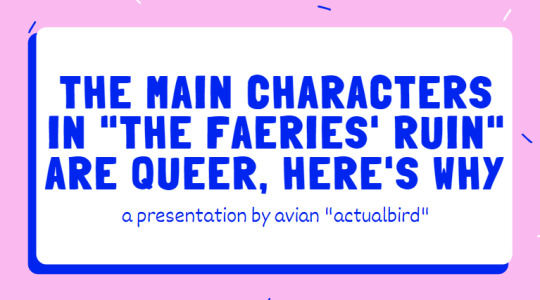
Good evening class.
Last last time I attacked your dashboards with a long post, I discussed Neopets that would benefit from therapy. I’m sticking with my Neopets shtick but in a funkier Pride flavor. In this post, I will be discussing why the three main characters of Neopets’ “The Faeries Ruin” are queer.
So what is “The Faeries Ruin?”
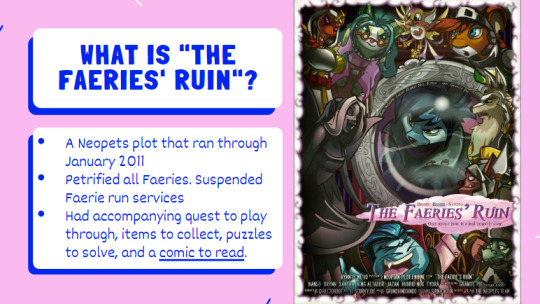
“The Faeries Ruin” was a Neopets plot that ran through January of 2011. Plots can affect the website's appearance, services, and gameplay, and this plot was most notable because it turned all the Faeries of Neopia to stone.
Quick crash course on Neopets lore, for those of you who don’t know anything about it: Neopets are the main population of the planet of Neopia, but they share the world with other creatures as well. One of these creatures are Faeries, magical beings who can be benevolent or malevolent. Majority of them are good, and can be visited to receive gifts, abilities, new appearances, better stats, etc. Faeries are the most powerful creatures on Neopia. With the Faeries of Neopia turned to stone, all Faerie run services, from games to shops, were suspended because. Well. It’s hard to run a business when you’re stone.
“The Faeries Ruin” had an accompanying quest to play through, items to collect, puzzles to solve, and most important to our discussion, is the accompanying comic to read.
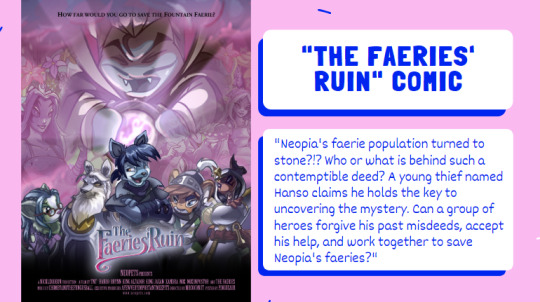
“The Faeries Ruin” comic is 17 chapters plus an epilogue. You can read the synopsis on the slide, and the story follows Hanso, a thief, Brynn, a guard, and Xandra, a scholar, who are all investigating the curse put on the Faeries.
A lot happens in the comic. Really, a LOT, so I don’t have time to summarize it for you. If you’re curious, you can read the plot here, and I’ll explain plot stuff as it becomes relevant to our discussion, but what’s really important are the characters.
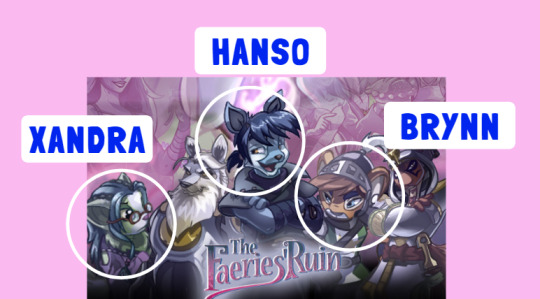
These three in particular, Hanso, Brynn, and Xandra, are who I will be focusing on from the queer perspective.
But because I aim to be inclusive, before we dive into calling Neopets characters queer, we need a quick crash course in ‘queer’ definitions.
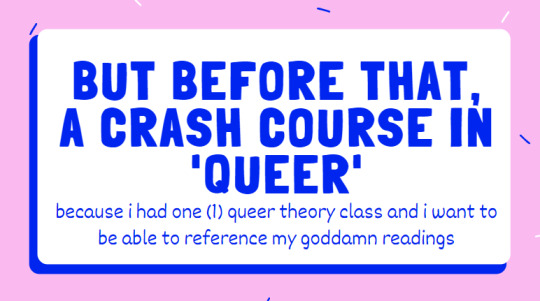
This is just so that we’re all on the same page. (Also so that I can use the readings I got from the queer theory class I was in last semester.)
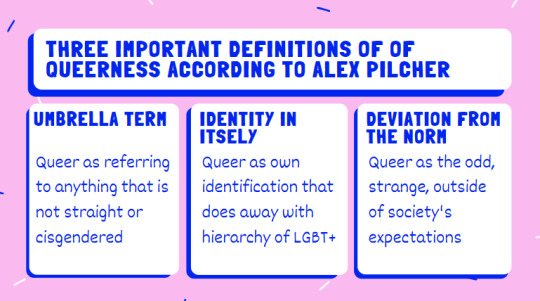
Alex Pilcher in the Introduction of “A Queer Little History of Art” gives the word “queer” three definitions. First is the simplest, the word “queer” can act as an umbrella term for anybody who is not straight or cisgendered. The second definition is “queer” as an identity in itself. Instead or in addition to using sexuality or gender labels, one can opt to identify as queer and that does away with any hierarchies or too small definitions that may bother other people. I, for example, am bisexual, asexual, and nonbinary. However, that’s kind of a mouthful, and sometimes I don’t want to explain every facet of my identity. So sometimes I just tell people I’m queer, and fuck them if that’s confusing, it feels good for me. The third definition of “queer” is what I will be referring to quite a lot of times in this discussion, “queer” as a deviation from the norm. This is a callback to the word’s more archaic use, meaning odd or strange. What is “queer” then is what goes beyond or resists against society’s expectations.
Queer Theory is a huuuuuuuge academic genre, and this is just the tip of the iceberg. But we’re on a schedule here, so let’s queer some goddamn Neopets.
First, we have Hanso.
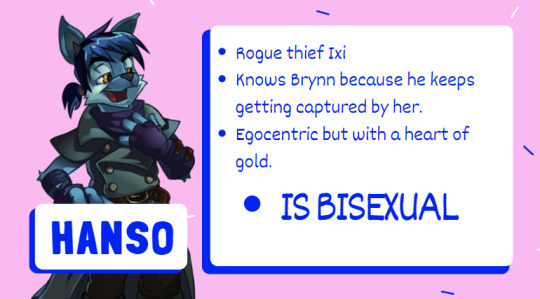
His Neopets species is an Ixi and he is a young rogue/thief. He knows Brynn because he’s a very shitty thief and he constantly gets captured by her. His personality is self centered and egocentric, but deep down, he has a heart of gold, even if his morals are a little skewed.
Also I think he’s bisexual. Why?
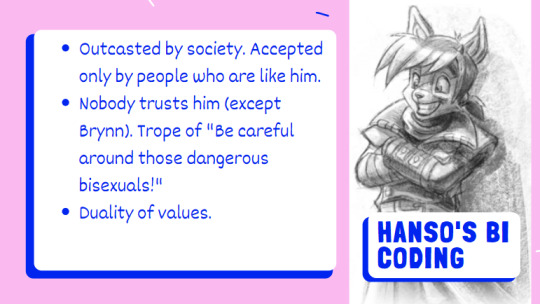
As a rogue/thief, he is outcasted by society, a type of queering from the norm. He is only accepted by those like him, which symbolically is parallel to how queer people often find other queer people to be with. Aside from Brynn, nobody trusts him. They think him to be a liar and a cheat, and this, I think, is parallel to the unsavory trope of the “untrustworthy bisexual.” Much the same way bisexuals are often told to “pick a side”, Hanso has both a desire for good and a desire for mischief, a duality that confuses other Neopets, and makes them wary of him.
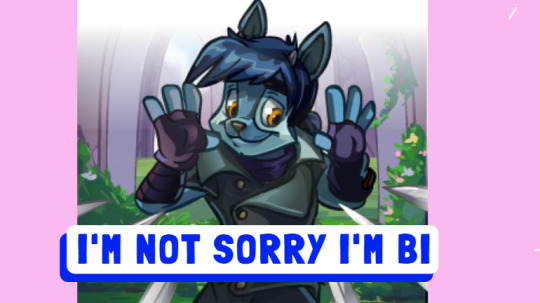
Hanso is bisexual. And he isn’t sorry about it.
Next up we have one of my early childhood crushes. Brynn.
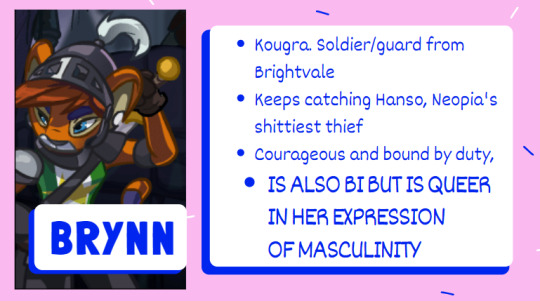
Brynn is a Kougra, a feline like Neopets species. She is a guard/soldier from the land of Brightvale. She knows Hanso because she keeps catching him, he’s a terrible thief. Her personality is one dominated by courage and a duty to Neopia’s safety.
And I think she’s also bisexual, but more interesting to me her queer expression of masculinity.
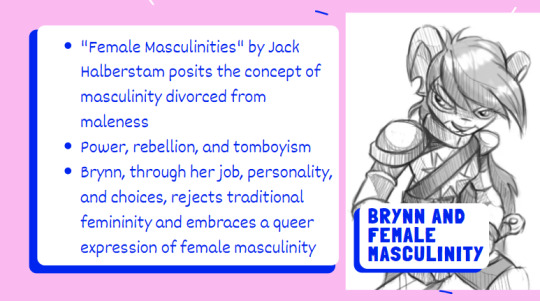
Jack Halberstam, a transgender man, wrote a book called “Female Masculinities” prior to his transition (I mention this because I know a lot of you may be wondering why a man gets any say about women’s issues, but I think this is a special case and that his views are still valid.) Halberstam, in his book, posits the concept of masculinity divorced from maleness. What this means, in simplest terms, is that masculinity is not something inherently male, just predominantly male. A female masculinity is thus outside of the norm, and a unique and queer expression of gender.
Concepts related to masculinity are things like power and rebellion. Strength, force, will, that kind of stuff. When we remove these things from maleness and allow femaleness to have these concepts, one of the results is tomboyism. The phenomenon of tomboyism is when a girl, usually young, exhibits masculine qualities. The thing about tomboyism is that it is reluctantly permitted during childhood but less expected as one grows older, the assumption being that a woman will submit to the societal expectations of what a woman is “supposed to be.”
I cannot find any canon sources to say that sexism is a huge problem in Neopia, but gender roles are still present. While we don’t see Brynn’s childhood in “The Faeries Ruin”, it doesn’t take much to imagine that her peers would be surprised with her choice to join the Brightvale Guard, a traditionally male pursuit. And yet she does it. She works hard and becomes such a good soldier that she aids King Altador himself during the story, that King Altador trusts and respects her opinions. Brynn rebels against society’s standards and asserts her own power.
Her personality exudes masculinity as well. Throughout “The Faeries Ruin” she is often dominant over the course of investigation, taking initiative, sometimes omitting truths for the greater good, and generally holding her judgement in high regard.
Her choices, especially in regards to her relationship with Hanso, is also something of note. Brynn is the one doing the catching and Hanso is the one being caught, an interesting subversion of expected gender roles. I will admit now that I have been withholding some information. Hanso, later in the plot of “The Faeries Ruin”, admits that he wanted to get caught by her as often as possible so that he would have an excuse to see her. Brynn did not know this, but I see it as a Hanso recognizing Brynn’s power and masculinity. I see it as a very romantic submission of Hanso to Brynn.
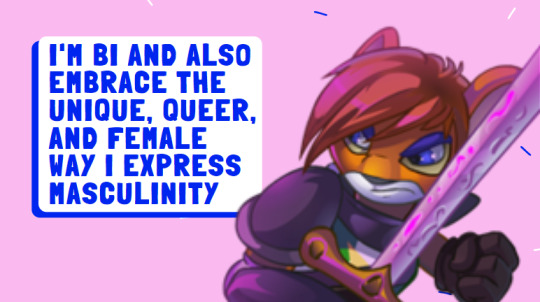
So Brynn is bi, because I say so. And she expresses masculinity in a unique, queer, and female way.
Now, before we move onto the last character, Xandra, I need to talk to you guys about Brynn and Hanso’s relationship. I think it is very good, it was one of my first OTPs, and here’s three reasons why it’s a good ship.
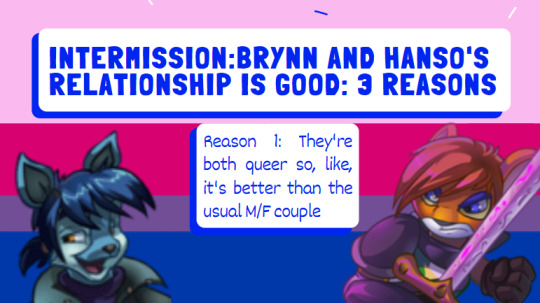
Reason 1: They’re both queer, so like, it’s better than the usual M/F couple. Bi people have more genders they’re attracted to, so the person they do end up choosing had to be better than literally everybody else. We can rest assured both of them are good eggs that are compatible with each other.
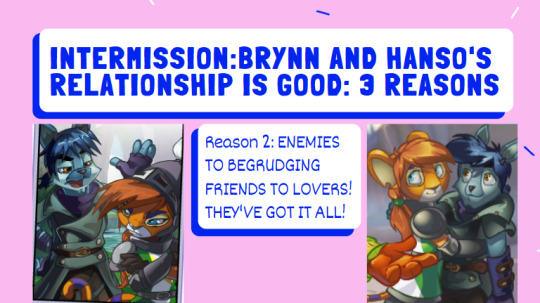
Reason 2: Their relationship over the course of “The Faeries Ruin” is that of the “enemies to friends to lovers” trope. Which, HELLO? GOOD SHIT? SIGN ME THE FUCK UP? THE HOSTILITY SLOWLY GIVING WAY TO RESPECT? THE RESPECT TURNING INTO ADMIRATION? Your honor, it’s delicious.
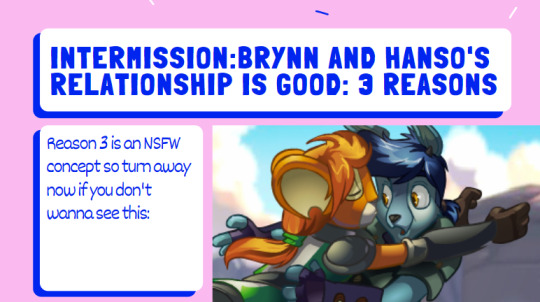
Reason 3: This reason is an NSFW concept, so if you don’t wanna see that, just Ctrl+F to the phrase “This brings us to our last character, Xandra” to skip it. We good? Everybody continuing to read wants to see this? Okay.
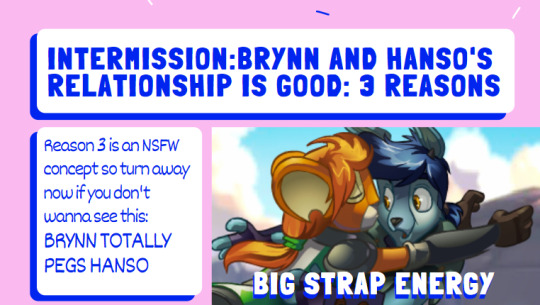
BRYNN TOTALLY PEGS HANSO. Like, I don’t have any sources, but by this point in the presentation, I hope I’ve established myself as an expert authority, and I hope you just believe me. She has the sword, in this relationship. Both literally and metaphorically. She pegs him and her strap is huge.
This brings us to our last character, Xandra.
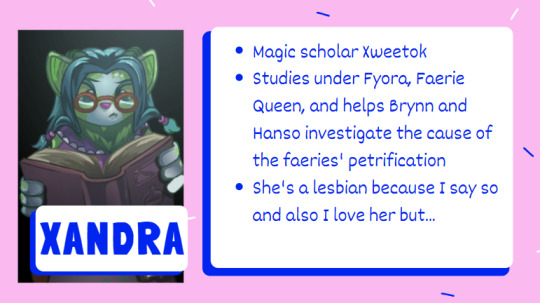
Xandra is a Xweetok and also a magic scholar. She studied under Fyora, the Faerie Queen, and helps Hanso and Brynn with their investigation of the faeries’ petrification. She’s a lesbian because I say so, but uhhhhhh���
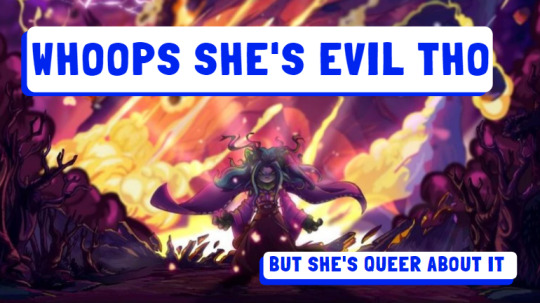
She’s also evil. Towards the end of “The Faeries’ Ruin” it was revealed that Xandra was the one who petrified the faeries all along. So yeah, she’s evil, buuuuuuut she’s super queer about it. How? Well, the answer lies in her motives.
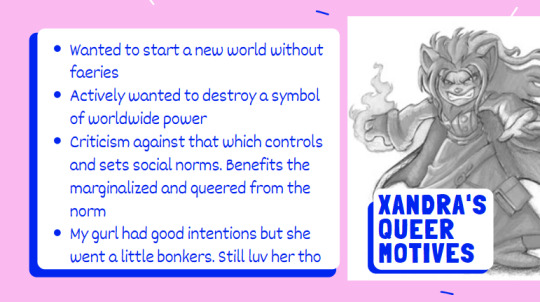
The reason why she petrified the faeries was because she wanted to start a new Neopia without them. She believed that the faeries were hoarding power instead of using it to truly help Neopians. She actively wanted to destroy not just the faeries, but a symbol of power and control that arguably rules the world she lives in. She criticizes against that which controls the social expectations, and this criticism and questioning benefits the marginalized, the queered from the norm. Her intention was to create a kind of utopia free from a governing body that holds all the power. That’s pretty damn queer.
Honestly, I’m a little pissed she was branded as evil for this, but it was revealed that when the faeries were petrified, their good magic was gone and left Neopia vulnerable to evil magic shadows and Xandra didn’t really care. So uh, she had good and radical queer motives, but she went a little bonkers with power. I still love her though.
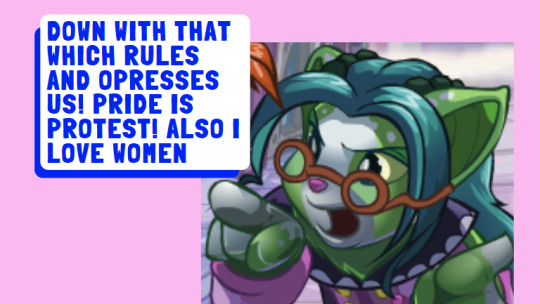
So, Xandra is pretty awesome, I hope she gets therapy then attends a Pride protest. She would totally be there reminding everybody that Pride started with riots. Also she loves women.
Thank you all.
(Read my other off the shits analysis essays at actualbird.tumblr.com/tagged/nobody-asked-but! If you have a request or suggestion for an off the shits analysis essay I can write, send me an ask!)
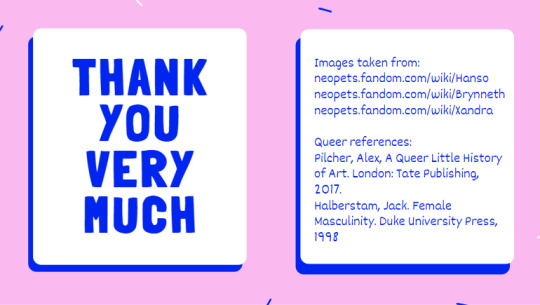
30 notes
·
View notes
Text
Safe Haven
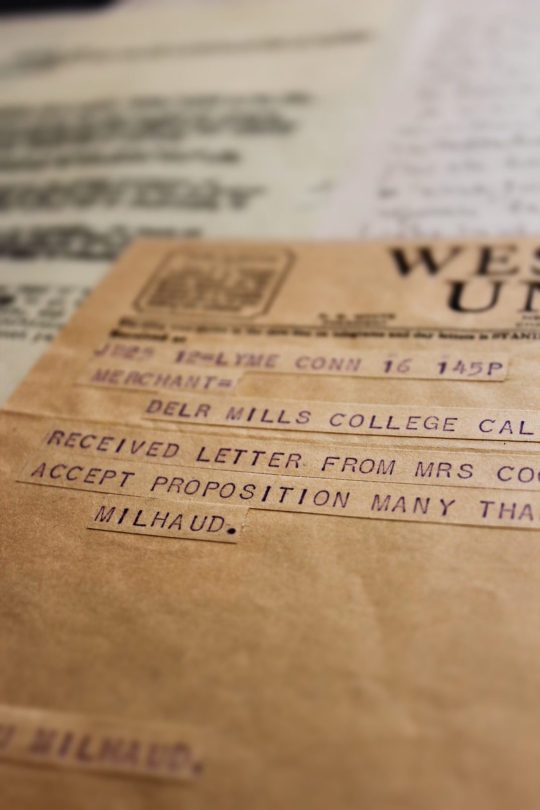
On December 8, 1941—the day after “a date which will live in infamy”—then-president Aurelia Henry Reinhardt wrote a letter to all Mills families. With the hindsight of nearly 80 years, it’s a surreal read; the main point of the letter was not to offer solace or organize war efforts, but to reassure parents that the Mills campus was unlikely to face any danger from a Japanese attack. “The English Channel is 26 miles wide; New York is 3,500 miles from Europe; California is 5,500 miles from Japan and 2,500 miles from our nearest possession in the Hawaiian group,” she wrote. “May I assure you that there exists no reason to change in any way the schedule and curriculum of this college in the spring term which begins Monday, January 5.”
At that point, no one knew that many students of Japanese descent would soon opt to leave Mills, hoping to avoid separation from their families as they were forced into internment camps across the United States. In the years leading up to World War II, President Reinhardt had approached a number of European artists and intellectuals to offer them a place at Mills as the Third Reich marched across the continent and sent to concentration camps anyone it deemed a threat, including Darius Milhaud and other notable figures in the College’s history, but that welcoming spirit couldn’t protect some of her own students.
When it comes to political and cultural forces outside the campus gates, the College has historically been limited in what it can do to protect its students. But as an institution, Mills has long welcomed members of marginalized communities, and outside restrictions have not altered the campus culture of acceptance.
In recent years, the term “sanctuary” has become a buzzword in our charged political environment. But in a historical sense, the concept originated with the sacred. In ancient Greece, spaces that honored the gods provided some measure of immunity to individuals escaping laws of the state (with limited success), and in Rome, Romulus established a zone on Capitoline Hill where asylum seekers from other places could find refuge. For centuries, places of worship have operated as spaces where people could take shelter, and it’s still happening today—churches around the world house migrants seeking to avoid deportation back to war-torn homelands.
The idea of sanctuary gained popularity in the United States in the 1980s when Central Americans began to flee their home countries in the wake of civil unrest, but Mills took on the responsibility of offering it 60 years earlier in the early days of World War II. In the 1961 book Aurelia Henry Reinhardt: Portrait of a Whole Woman, Chaplain George Hedley wrote that President Reinhardt contacted the Emergency Committee in Aid of Displaced German Scholars (later Foreign Scholars) to invite intellectuals to Mills as soon as Hitler took power in Germany in 1933. Hedley noted that legends were told of Reinhardt physically transporting those scholars to campus herself.
A number of professors soon made their way to Oakland, including Alfred Neumeyer, who taught art history and directed what was then the Art Gallery, and the married couple Bernhard Blume and Carlotta Rosenberg. A German playwright, Bernhard headed up the German Department at Mills until 1945, and Rosenberg was a proponent of educating workers and women.
Of course, the most well-known Mills expats were the musician Darius Milhaud and his wife, Madeleine. In speaking with the author Roger Nichols in 1991, Madeleine detailed her family’s reaction when the Nazis entered Paris in June 1940: “We knew… that Milhaud was among the first on a list of intellectuals to be arrested because he was well known in Germany as a Jewish composer, and also because he did not share their right-wing ideals.”
The Milhauds made their way to Lisbon with plans to fly to New York, using an invitation from the Chicago Symphony Orchestra to obtain visas. But upon arrival in Portugal, their plane tickets were declared invalid because they had been bought with French francs. The three—Darius, Madeleine, and their son—were just about to board an American freighter to cross the Atlantic when a telegram arrived with an offer to teach at Mills. The San Francisco-based French conductor Pierre Monteux had contacted President Reinhardt after learning that Milhaud was fleeing to America and connected the two.
Milhaud cabled his acceptance of the position and, a few months after arriving on campus, Dean of Faculty Dean Rusk (later US Secretary of State during the Vietnam War) wrote to the State Department to plead his case for Milhaud’s continued residency in the United States, which hinged on his history of contribution to the arts. Milhaud taught on and off at Mills from 1940 until 1971.
Milhaud’s influence on the Music Department (and the rest of the College) is well known, though he was not the only academic who molded Mills in indelible ways during this time. Helene Mayer, a champion German fencer at the 1928 Olympics, was studying at Scripps College when Hitler rose to power in her home country. She then enrolled at Mills for a master’s in French. While on campus studying for her MA and, later, teaching German literature, she founded the Mills College Fencing Club, jump-starting an organization that lasted for decades. And it’s to the credit of these scholars that the German Department at Mills built a strong enough foundation to eventually send many of its students abroad as Fulbright scholars.
The situation with students of Japanese descent was not nearly as easy to solve, however, with President Franklin D. Roosevelt establishing internment camps less than three months after the Pearl Harbor attack.
Alumnae who were at Mills during the attack remember that day as a sunny one, with word of the incident filtering in as they arrived back in their residence halls after Sunday chapel service. Japanese American students soon found their freedoms curtailed bit by bit, starting with an Army-ordered curfew that restricted their movement even on the Mills campus.
May Ohmura Watanabe ’44, who was born in California to American citizens, wrote about her experiences in multiple issues of the Quarterly. “I remember Dr. Hedley, the chaplain, was very upset and angry. I can still feel his hand tightly holding mine, his body slightly bent forward as he hurried to look at the curfew proclamation posted on the telephone pole just outside the campus,” she wrote in 1985. “He even took me to the Army’s headquarters in San Francisco to protest and to state his disbelief. All in vain.”
Watanabe soon left Mills and returned home to Chico so that she wouldn’t be sent to a different internment camp than her parents and brother. She spent a year at the Tule Lake Relocation Center near the Oregon border, then was released as part of a program allowing some detainees to work or attend school in special approved zones. Watanabe was allowed to transfer her credits to Syracuse University, where she studied nursing. “I remember the special arrangements Mills made for me before evacuation to take my exams in Chico supervised by my high school dean,” she wrote.
The late Grace Fujii Kikuchi ’42 made a similar choice to leave Mills to avoid separation from her family. As a senior, she was more easily able to bring her time at Mills to a close, though it wasn’t a happy time. “My professors at Mills had arranged for me to take my [exam] at a nearby high school,” she wrote in the same Quarterly issue. “All I know is that I was graduated in absentia with my class. Not to be able to attend my commencement after four hard years of work was a bitter disappointment to me.”
The frustrations of the Mills administration during this era were captured in a play by Catherine Ladnier ’70, which she based on actual letters President Reinhardt received from students who left the College due to World War II, including Japanese American students in internment camps. Titled A Future Day of Radiant Peace, the play details the personal turmoil these students experienced as they abandoned their bustling lives at Mills for the uncertainty of the camps. It also demonstrates what little power anyone on campus had to prevent the exodus.
In the aftermath of the war, however, Mills was able to provide sanctuary to several students whose home countries were suffering. Catherine Cambessedes Colburn ’47 and Noramah Sumakno Peksopoetranto ’56 traveled to the College from France and Indonesia, respectively. In the spring 1997 issue of the Quarterly, Colburn wrote about the strangeness of going from a country recovering from war to a land of plenty.
“Mills had sent a list of what I would need, and I owned next to none of the items, nor could I get them. Coupons, given out rarely, were required to buy anything. Besides, the stores were next to empty,” she wrote. “I exchanged my wine ration with a friend for her fabric coupon and my cigarette ration with another for hers, and got enough material for two clothing items.”
Peksopoetranto earned her opportunity to attend Mills through a one-year scholarship from the Edward H. Hazen Foundation. At the end of the year, Dean Anna Hawkes offered her room and board for a bachelor’s degree in education; she spent that summer staying in the home of Librarian Elizabeth Reynolds.
On October 29, 2018—two days after 11 were killed in a shooting at the Tree of Life Synagogue in Pittsburgh, Pennsylvania—President Elizabeth L. Hillman sent an email to the Mills community. In it, she harkened back to the College’s history of providing sanctuary to Jewish scholars during World War II and the inspiration they provided to generations of students. “Higher education institutions like Mills have a special role to play in creating and sharing knowledge across boundaries of faith, race, gender, and background,” she wrote. “We can only fulfill our mission when everyone in our community is safe, respected, and able to grow and learn.”
In the last few years, President Hillman has sent a number of similar emails to the campus community after attacks, in the United States and abroad, that have targeted historically marginalized groups. According to Dean of Students Chicora Martin, the typical campus response finds its roots in Mills history. “Whenever an incident happens, we’re among a community where people may not always know what to do, but they are prepared to do something,” they said. “It’s part of our culture.”
“In times of immense crisis and identity-based violence, there is this depth of emotion and despair, but also a desire to be in community,” says Dara Olandt, campus chaplain and director of spiritual and religious life. “It has been very moving for me to see the ways in which students have offered leadership and shown up for each other.”
Olandt attributes the campus-wide attitude of acceptance and protection to the College’s past religiosity—in particular, President Reinhardt was the first woman moderator of the American Unitarian Association. (Olandt herself was ordained by the Unitarian Universalist church.) The chapel “is a refuge, and a place of deep hospitality. That’s what the forebears [who created] this chapel were really about,” Olandt says. “There’s power in this symbolic place where people are welcome in the fullness of their lives, no matter their identities.”
She also counsels those who travel to Mills from outside the country and hail from distinctly different societal and religious backgrounds than their US-born peers. That demographic has naturally been part of the student body for decades, but provides a different set of challenges due to the requirements of F-1 and J-1 student entry visas. Dean Martin serves as the principal designated school official on the Mills campus, so they are the first point of contact for the US government. “Every year, we have someone who can’t make it here because they can’t get a visa,” they say. “There are lots of restrictions with international students, and there’s a lot of documentation that you have to provide just for them to do normal-ish things, like getting a Social Security card or a driver’s license.”
Over the last four years, the legal status of undocumented students has been called into question across the country, and as a Hispanic Serving Institution, Mills has been prompted to respond. Under the Deferred Action for Childhood Arrivals (DACA) program, which began in 2012, undocumented immigrants who arrived in the US before they turned 18 could be granted renewable two-year periods where they would not be deported. When Donald Trump was elected to the presidency, he pledged to end the program—and set off a chain reaction at colleges and universities across the country, which became known as the “sanctuary campus” movement.
On November 16, 2016, President Hillman was one of hundreds of signatories to the Statement in Support of the Deferred Action for Childhood Arrivals (DACA) Program, which underscored the contributions that its recipients have made to college communities across the country. “America needs talent—and these students, who have been raised and educated in the United States, are already part of our national community,” the statement reads. “They represent what is best about America, and as scholars and leaders they are essential to the future.”
Hillman also joined with more than two dozen college leaders in December 2017 as founding members of the Presidents’ Alliance on Higher Education and Immigration, which advocates for fair treatment of DACA and international students, and she continues to contribute to amicus briefs compiled by the alliance on behalf of DACA students.
In practical terms, Martin says that Mills provides grants to affected DACA students to cover the legal paperwork required to renew their statuses, and the College will provide financial assistance to any undocumented student in the same amount the student would have received from a Pell Grant, which is a federal program and therefore off-limits to non-citizens.
But in terms of sanctuary? If immigration officials asked Mills to turn over student records, the College is theoretically protected by the Family Educational Rights and Privacy Act (FERPA), which prohibits the disclosure of student information, including immigration status, to parties beyond those that need to know for the purposes of that student’s education. Nothing like that has happened yet, but administrators say that it’s really not the point. The last few years have, in the end, cemented the kind of institution Mills wants to be.
“We were asking questions about our own values. The government’s now actively not supporting [these] students, so we have to come out very strongly with concrete statements and actions that clarify for our community where our values lie,” Martin says.
“Aurelia Reinhardt was deeply motivated by her values, which had roots in her religious and spiritual background,” Olandt adds. “She was very much anchored in a spirit of service and what we call today solidarity with marginalized folks. How can we uphold the best of humanity and live a moral and ethical life in the face of challenge?”
1 note
·
View note
Note
hi there! i really appreciate the resources on clobber claims, but something i still can't really explain is passages that refer to marriages as being husband and wife, for example ephesians 5:22-33 - if husband and wife is the only model of marriage that the bible talks about in this way, how could it be applicable to all marriages (ie. same gender marriages)? 1/2
(2/2) and by extension, if the way marriage is talked about is not inclusive of all marriages, wouldn’t it mean same gender marriages aren’t included/accepted? sorry if i’ve worded it in a rather strange way, i’m not sure how to frame my question and i’m just kind of confused about it all. thanks ever so much and God bless you!
____
Hey there, great questions!
My quick response is:
the Bible was written in cultures much older than and utterly different from our own. Our concept of marriage doesn’t directly translate into anything depicted in the Bible. Plus, some things that exist now didn’t exist back then (cars, phones, terminology like “LGBT” or like “Christianity”) – so just because the Bible never explicitly mentions a certain thing doesn’t mean it condemns that thing, you know?
One thing that this means for me at least is that I need to constantly challenge my own assumptions about which kinds of relationships are “valid” or not in God’s eyes. What about polyamorous ones? Ones that involve sex without marriage? Marriages or other forms of committed partnership that don’t include sex?
My longer answer is below!
__________
I’ve got a post that responds to the question: The Bible’s passages on marriage are only about man+woman couples – so does that mean it condemns same-sex marriage? In that post you’ll find….
a link to another post that discusses what sexuality and marriage were “like” in biblical times – for instance, the concept of marriage as we know it today did not really exist in the time of the Hebrew Bible (“Old Testament”)! The closest thing that did exist was more like an economic agreement in which the woman was like property – it wouldn’t have made much sense for a two-man or two-woman relationship.
examples of stories in the Bible that actually do something somewhat like a marriage between two men, or between two women
Check out this post for even more – responding to the question “What does God consider marriage?”
________
Next, I said at the start of this post that just because something’s not mentioned in the Bible doesn’t mean it’s rejected by the Bible / by God. I want to note that the reverse is true as well: just because the Bible does discuss a thing doesn’t mean its authors and/or God affirms that thing – the Bible’s full of stories of attempted genocide, sexual violence, sexism, ableism, and more; but that doesn’t mean God condones those things! (If you’re interested in a book that delves into the various forms of violence in the Bible and what we should make of it, I recommend Inspired by Rachel Evans.)
The post I linked up above about biblical marriage describes how the closest thing to our concept of “marriage” in the Bible is more of a business transaction between men – usually the father of a woman and the man who wants to take her as his “wife" (or concubine, sex slave, etc. Yes, ew.) Just because that’s the model of marriage described in the Bible doesn’t mean God wants our partnerships to be like that! These things were just part of the “landscape” of the time and place the Bible was written.
Even when the authors of scripture seem totally content with those models or concepts, or even affirm and build off them like Paul does for marriage in that Ephesians passage you mentioned, that’s not still not a reason in itself to conclude that God also affirms them.
One can hold that the Bible is divinely inspired without concluding that that means that every viewpoint expressed in it is itself the “divine opinion” – human authors penned the Bible’s various books, and necessarily brought their human limitations and assumptions to that writing. Ephesians 5: 22-23, for instance, supports the marriage model that was normative in Paul’s day and that he therefore assumed was moral or “correct” – one in a marriage is necessarily between a man and a woman and contains a hierarchy, wherein wives are subject to / submit to their husbands. But is that really what God wills for our relationships? For explorations of that question, see this post on women in the Bible! And if you want even more to read, see this post too.
________
With all of this in mind, you might be wondering – so, is there anything in the Bible that can helpfully inform our marital relationships today? I think so!
People who consider the relationship between Adam and Eve to be a sorta paradigm for marriage should know that Eve is Adam’s equal, any idea of her subordinate status comes only after the Fall corrupts human relationships
As one of the linked posts above discusses, relationships between characters like Jonathan and David might could teach us some things about marriage
My wife and I once made a video on the concept of “complementarianism” and how the way it’s usually taught is super sexist and homophobic but maybe it can be reworked into something more LGBT-affirming.
…And honestly, if nothing else, some of the relationships we see in scripture might be examples of what not to do in a marriage (or any romantic/sexual relationship). We can study some of the relationships in the Bible and consider how they bear good or bad fruit, and take on or avoid characteristics of those biblical relationships in our own relationships.
Finally, one more post that might help as you continue to explore this topic – how to we take cultural context and human authors’ limitations into account without simply using the Bible to justify our own views; and if God affirms LGBT persons why is it so hard to “prove” it?
Good luck, and please let me know if you have more questions!
31 notes
·
View notes
Text
Femininity in the Harry Potter books
I started writing this essay over a month ago, before (as it felt like) all hell broke loose regarding JK Rowling’s transphobic tweet. As a genderqueer person myself, her comments hurt. I have loved the Harry Potter novels since I was a teenager and have often found solace in both the magic of the story and the magic of the community around these books. So, in immediate aftermath of Rowling’s comments, I struggled with how to engage with this community and these books. At first, I really did not feel like continuing to write this analysis. Now, however, I felt like I at least owe it to my love of this series and fandom to finish it. So here we go:
Last year I wrote a post about how several of the villains in Harry Potter seem to be coded as queer. In that text I also wrote that I sometime would analyse the way femininity is portrayed in the Harry Potter books. Well, studying, work, and writing other stuff got in the way, but now I’m finally getting around to it! This post is definitely inspired by some of the conversations from the excellent podcast The Quibbler, where they lament some of descriptions of feminine characters in the books. So, shout out to them, do go check them out! In this analysis I’m going to lay out several different aspects of what I see as problematic portrayals of femininity in the Harry Potter books: the silly girls, the villainous feminine men, and the (queer coded) feminine evil women.
Now, I first want to focus on what I describe as “the silly girls”. When reading descriptions of girls in the Harry Potter novels, I can’t help seeing how many of them are portrayed in a way that Julia Serano might call “traditionally sexist” (2007, 326). Serano describes traditional sexism thusly:
Traditional sexism functions to make femaleness and femininity appear subordinate to maleness and masculinity. (…) For example, female and feminine attributes are regularly assigned negative connotations and meanings in our society. An example of this is the way that being in touch with and expressing one’s emotions is regularly derided in our society. (…) in the public mind, being “emotional” has become synonymous with being “irrational”. Another example is that certain pursuits and interests that are considered feminine, such as gossiping or decorating, are often characterised as “frivolous”, while masculine preoccupations- even those that serve solely recreational functions, such as sports- generally escape such trivialization. (Serano 2007, 326-327)
That is to say, that which is deemed feminine is seen as silly and irrational. Unfortunately this fits quite well with how a lot of the girls are portrayed in the novels, such as in the fourth novel before the Yule Ball: “Girls giggling and whispering in the corridors, girls shrieking with laughter as boys passed them, girls excitedly comparing notes on what they were going to wear on Christmas night …” (Rowling 2000, 338) This motif of giggling girls returns many times, with Harry even thinking about Parvati that: “[He] was relieved to see that she wasn’t giggling.” (ibid 358) Speaking of Parvati, her and Lavender are continually portrayed as silly girls throughout the series, such as in this moment in Order of the Phoenix:
‘I’ll bet you wish you hadn’t given up on Divination now, don’t you Hermione?’ asked Parvati, smirking.
It was breakfast time, two days after the sacking of Professor Trelawney, and Parvati was curling her eyelashes around her wand and examining the effect in the back of her spoon. They were to have their first lesson with Firenze that morning.
‘Not really,’ said Hermione indifferently, who was reading the Daily Prophet. ‘I’ve never really liked horses.’
She turned a page of the newspaper and scanned its columns.
‘He’s not a horse, he’s a centaur!’ said Lavender, sounding shocked.
‘A gorgeous centaur…’ sighed Parvati. (Rowling 2004, 528)
Here Parvati and Lavender’s apparent crushes on Firenze is portrayed as silly, and their focus on their appearance is probably meant to be seen as frivolous. It is also starkly contrasted with Hermione’s apparent rationality, especially as she is sitting reading a newspaper in the scene.
Now, how about the men in the story, are they not portrayed negatively as well? Well, yes, of course. But when looking at some of the male “villains” of the story, many of them are described as quite feminine as well. In my previous text I noted how this was the case for Lockhart for example, who is described like this when the reader first meets him:
Gilderoy Lockhart came slowly into view, seated at a table surrounded by large pictures of his own face, all winking and flashing dazzlingly white teeth at the crowd. The real Lockhart was wearing robes of forget-me-not blue which exactly matched his eyes, his pointed wizard’s hat was set at a jaunty angle on his wavy hair. (Rowling 2010, 49)
Lockhart is here (and throughout Chambers of Secrets) described as both vain, and quite feminine with his stylish outfits. These traits are part of what marks him out as an unlikable character. I noted above how Julia Serano writes about traditional sexism that traits and interests that are deemed feminine (such as caring about clothes) are devalued. Serano also writes about oppositional sexism, which she describes as the idea feminine attributes are seen as natural in women, and unnatural in men (2007, 326). Similarly, Lockhart’s “feminine” seems to be perceived as abnormal/bad in the story.
Another male villain that is described as feminine is Quirrell. When Harry sees him at the welcoming feast in the first book, he is described like this: “Harry spotted Professor Quirrell, too, the nervous young man from the Leaky Cauldron. He was looking very peculiar in a large purple turban.” (Rowling 1997, 134). Both the nervousness and the turban later turn out to be part of Quirrell’s disguise as one of Voldemort’s agents. The nervousness making him seem less capable of evil deeds, and the turban hiding the fact that Voldemort is living as a parasite on his head. Both of these disguises are interesting in relation to femininity though. Stephen Whitehead writes that as a man one is expected to embody strength, toughness and control over physical space (2002, 189). He contrasts this with how women are expected to embody caution, restraint etc. With Quirrell’s nervousness (and re-occurring stutter) it is quite clear that he comes off as more feminine than masculine. Another thing is this turban that he wears. Based on his physical description Quirrell seems to be a white Englishman (he is described as “pale” when he is first introduced) (Rowling 1997, 80). Later he claims that this turban was a gift from an African prince for helping him get rid of a zombie (ibid, 147). So, it seems established that this turban is seen as strange on him, and that is connected to Africa. The way this is described makes me think of orientalism. Now, what is orientalism? It is a term that is meant to describe the way Europeans have viewed “the Orient” historically and to this day. This often entails seeing people from this region as savage, sexually depraved, but also viewing the men as emasculated and week (Carroll 2018, 121). (I’m referencing this specific book because I happened to have it on hand, but a lot of different people have written on texts on this theme). In story, Quirrell claims that he (the white Englishman) got this turban as a gift from helping an African prince (it should be noted that “Africa” is very vague, I’m here choosing to see it as part of “the Orient”, but it’s not necessarily that). The other characters doubt this story, but it does tie in with the perception of “oriental” men as week (and in need of help). But Quirrell wearing a turban also ties him to this image, and perhaps makes him seem even more effeminate.
Finally, I want to touch on a theme that I wrote also about in the text about queer coded villains in the Harry Potter books, that of the female villains. Here I’ll focus on Dolores Umbridge and Rita Skeeter, and how their femininity is part of what is meant to make the reader think of them as bad. When we first meet Skeeter, she is described like this:
Her hair was set in elaborate and curiously rigid curls that contrasted oddly with her heavy-jawed face. She wore jewelled spectacles. The thick fingers clutching her crocodile-skin handbag ended in two inch-nails, painted crimson. (Rowling 2000, 266)
So, the description makes her sound feminine, but there’s also something off with her rigid curls, heavy-jawed face, and long red nails. This reminds me of how feminist theorist Ulrika Dahl describes that being femme can be queer (2016). By doing femininity wrong, for instance in a way that is seen as trashy, one can come off queer. Another way of seeing this is to analyse the way that Umbridge is described:
She looked, Harry thought, as someone’s maiden aunt: squat, with short, curly, mouse-brown hair in which she had placed a horrible pink Alice band that matched the fluffy pink cardigan that she wore over her robes. (Rowling 2004, 183)
I want to note two things here. Firstly, that she is described as a maiden aunt, that is a woman who is of an age where she should be married with children but are not. Clearly, she’s breaking the expected life pattern of a woman here. Secondly, the way her clothes are described makes her seem girlish, which is the same way her voice is described as on several occasions. Her appearance is not what is expected of a woman of her age. This puts me in mind of what Elizabeth Freeman describes as temporal drag (2000). Freeman writes that when we as children learn how to perform our gender properly, mainly by imitating our parents, we must also learn how to adapt this to our own time. So, while a woman is expected to learn from her mother how to be a woman, she cannot simply copy the mother’s look. Freeman points out that if she herself were to copy the way her own mother looked during Freeman’s childhood (ca 1970) she would not look normative at all. But we can play with this temporal crossing for queer effect if we wish. I do not think this is was Umbridge consciously does, but her femininity does have a somewhat queer effect because of the way it does not fit her age.
So, in conclusion, we can see that throughout the Harry Potter novels, several feminine characters are described in a negative way. Both “good” characters such as the silly girls, and more “evil” ones such as Lockhart, Quirrell, Skeeter, and Umbridge. These latter ones also have a somewhat queer coding. With Quirrell there is also a sort of racialised femininity, with the description of his turban. It is unfortunate that these characters are described this way, however, it rings true to negative stereotypes from our own world.
I’m not sure how to finish this analysis to be quite honest. It makes me sad to find all of these elements in the books that I have loved. But, to be quite honest, it’s possible problematic things in most works of fiction when you start looking. Nonetheless, this last month or so has been tough on my love of the Harry Potter novels and community. Going forward I want to try to focus on the more positive aspects of them, such as the magic this community makes together (while remembering the more negative things of course). I’m not sure how. But I felt like I had to get this text out there first. So here it is.
References
Carroll, Shiloh. 2018. Medievalism in A Song of Ice and Fire and Game of Thrones. Cambridge: D.S. Brewer.
Dahl, U. 2016. “Queering Femininity”. lambda nordica. 2016/1-2, pp. 7-20.
Freeman, Elizabeth. 2000. ’Packing History, Count(er)ing Generations’ New Literary History, 31(4): 727-744.
Rowling, J.K. 1997. Harry Potter and the Philosopher’s stone. London: Bloomsbury.
Rowling, J. K. 1998. Harry Potter and the Chamber of Secrets. London: Bloomsbury.
Rowling, J.K. 2000. Harry Potter and the Goblet of Fire. London: Bloomsbury.
Rowling, J.K. 2004. Harry Potter and the Order of the Phoenix. London: Bloomsbury
Serano, Julia. 2007. Whipping Girl: A Transsexual Woman on Sexism and the Scapegoating of Femininity. Seal Press, San Francisco
Whitehead, Stephen M. 2002. Men and Masculinities, Cambridge and Malden: Polity.
12 notes
·
View notes
Text
JANET STREET-PORTER: Thanks to Harry Potter Emma Watson has a magical life most young women would kill for, so why is she so deeply irritating?
Daily Mail nov 2019: I hardly remember turning 30, it was no big deal. I was on my second marriage, my TV career was starting to go well - but I’d worked my arse off for the preceding 12 years to get on. There wasn’t time to worry about another birthday.For multi-millionaire actress Emma Watson, though, facing up to the big three-o next April is fraught with ‘stress’ and an ‘incredible amount of anxiety’.
FOR GOD’S SAKE, what’s stressful about already having enough money for the rest of your life, being blessed with a first rate brain, perfect features, a cut glass accent (great for getting a good job and roles) and benefiting from unswerving support from middle class parents? Where’s the stress in forging a non-stop career from the age of nine, one which has brought you worldwide fame and given you access to world leaders, pop stars and anyone famous who’s a Harry Potter fan?
Somehow, in spite of all her good points and natural assets, Emma Watson manages to be one of the most annoying people around. She uses every public forum to give us a little manifesto, telling other women how to think, what we should be doing to save the planet, how to stop injustices and bring about equality for all. Even nice Lorraine Kelly has admitted she finds Emma ‘just a wee bit irritating’ - which says it all.
In her latest interview (in British Vogue) Emma has (once again) come up with terminology so pretentious it could have come from the mouth of Gwyneth Paltrow, that other self-appointed spokesperson for global womankind.
Emma describes herself as ‘self-partnered’, ie single. Using the word single is just too crass and low rent for a quasi-intellectual like this one, who studied at Brown University in the US and Oxford.
Emma is stressed (it seems) because of ‘subliminal messaging…if you do not have a husband, if you do not have a baby, and you are turning 30, and you’re not in some incredibly secure, stable place in your career, or you’re just figuring things out…there’s this incredible amount of anxiety’.
In spite of being photographed with a steady stream of very eligible men she says: ‘I’m very happy (being single). I call it self-partnered’. For some shallow people (like me) self-partnering sounds like an exotic form of masturbation, but nothing that low rent would cross this paragon’s mind.
With unerring regularity, Emma turns every chat into a baffling discourse on her brand of modern feminism. Talking about her role in the new Hollywood movie of Little Women alongside Laura Dern and Meryl Streep, she says ‘we met in activist spaces, so we had this allyship and solidarity as activists that had been part of a certain movement before we ever worked together’.
Pass the sickbag, they probably swapped a tweet. Dern and Streep were strong empowered and inspirational women long before Emma became Hermione Granger. Unfortunately, after years playing the character, Emma has morphed into Hermione; brainy and well-meaning, but a little bit odd. She probably finds it strange that other women from different backgrounds and cultures might find her a bit patronising and inauthentic. Every role isn’t just a job but a chance for Emma to spread her self-regarding gospel. Apparently her Little Women character (Meg March) is really ‘a feminist’, because she has made the choice to be a wife and homemaker.
When she played Belle in Disney’s remake of Beauty and the Beast in 2017, Emma claimed she wasn’t just portraying a beautiful pliant woman in a big frock, trapped by a rich weirdo who has decided to turn his back on the world, but an ‘inventor’.
The role might have been ground-breaking if Belle had not been white. Emma posted pictures of her promotional tour for the film on social media in a series of incredibly glamorous eco-friendly dresses which must have cost a fortune. She posed for the cover of Vanity Fair wearing a semi-transparent top revealing a fair bit of her breasts. Nothing wrong in that - except that a couple of years earlier Emma admitted she was ‘conflicted’ about Beyonce’s use of blatantly sexual imagery. The fact that Beyonce had posed in front of a sign saying FEMINIST at the Grammys in 2014 seemed to have passed Hermione/Emma by.
In 2017, Emma - considered by critics to be a ‘competent’ actress - accepted the first gender-neutral MTV Music and Film award for best actor for playing Belle, and announced she was proud ‘to be part of a film which celebrates diversity, literacy, inclusion and joy’. And I expect you thought it was just a fairy story!
Another small faux pas occurred at the 2018 Academy Awards, when ‘wannabe edgy’ Emma sported a temporary tattoo reading TIMES UP, showing solidarity with the MeToo activists, but sadly her makeup artist forgot the apostrophe (as in Time’s Up) and she was forced to make a joke on social media. BTW isn’t having a temporary tattoo (when it’s not Hallowe’en) just a little bit pathetic and middle class?
Emma has founded an online book club, featuring inspirational books (including the Vagina Monologues) by female authors. She is a passionate reader who ‘hides’ books around London for commuters to discover. With all her cash, why doesn’t Emma pay to reopen the dozens of former libraries in London, so children can enjoy the delights of reading for nothing?
Dolly Parton, whose parents couldn’t read, is just as passionate as Emma about inequality - in her case, the damage caused by illiteracy. She founded the Imagination Library in Tennessee in 1995, offering free books to children under the age of 5- her charity has spread across the US, to Canada, Australia, Ireland and now the UK.
Is Emma Watson in touch with today’s young women? Am I being unfair when she means so well? In this situation, I always ask my hairdresser (female, 39 and also ‘self-partnered’) what she thinks.
Her reaction to Miss Perfect’s brand of feminism would be two words - get lost.
13 notes
·
View notes
Text
Book Log of 2019
I kept a record of how many books I read in 2019. I liked most of them so I would recommend you give any of them or read.
So on with the list! If it has an X next to it then it means I didn’t finish reading it.
#1: Warcross by Marie Lu.
#2: Children of Blood and Bone by Tomi Adeyemi.
#3: Kingdom of the Blazing Phoenix by Julie C. Dao.
#4: Bruja Born by Zoraida Córdova.
#5: A Thousand Beginnings and Endings by Roshani Chokshi, Alyssa Wong, Lori M. Lee, Sona Charaipotra, Aliette De Bodard, E. C. Myres, Aisha Saeed, Preeti Chhibber, Renée Ahdieh, Rahul Kanakia, Melissa De La Cruz, Elsie Chapman, Shveta Thakrar, Cindy Pon, and Julie Kagawa.
#6: The 57 Bus by Daska Slater
#7: The Dark Descent Of Elizabeth Frankenstein by Kristen White.
#8: Three Dark Crowns by Kendare Blake
9#: Broken Things by Lauren Oliver.
10# The Raven Boys by Maggie Stiefvater
11# A Study In Charlotte by Arthur Doyle
12# Simon Vs The Homo sapiens agenda by Becky Albertalli
13# The Dream Thieves by Maggie Stiefvater
14# Blue Lily, Lily Blue by Maggie Stiefvater
15# The Raven King by Maggie Stiefvater
16# Carry On by Rainbow Rowel
17# Teen Trailblazers, 30 fearless girls who changed the world before they were 20 by Jennifer Calvert
18# Evermore by Sara Holland
19# The White Stag by Kara Barbieri
20# One Dark Throne by Kendra’s Blake
21# Six of Crows by Leigh Bardugo
22# A Blade So Black by L.L. McKinney
23# King of Scars by Leigh Bardugo X
24# Truly Devious by Maureen Johnson
25# The Vanishing Stair by Maureen Johnson
26# Death on the Nile by Agatha Christie
27# Mythology by Edith Hamilton
28# Percy Jackson Greek Gods by Rick Riordan
29# Two Can Keep A Secret by Karen M McManus
30# The Hazel Wood by Melissa Albert
31# Murder on the Orient Express by Agatha Christie
32# Superman: Dawnbreaker by Matt De La Peña
33# The Phantom of The Opera by Gaston Leroux
34# Roseblood by A.G Howard X
35# Catwoman: Soulstealer by Sarah J Maas
36# Wonder Woman: Warbringer by Leigh Bardugo
37# Velvet Undercover by Teri Brown
38# Through The Woods by Emily Caroll
39# The Wicked Deep by Shes Ernshaw
40# Wicked Lovely by Melissa Marr
41# Girls of Paper and Fire by Natasha Ngan
42# Where She Fell by Kaitlin Ward
43# Modern Herstory: Stories Of Women and non binary people rewriting history by Blair Imani
44# White Rabbits by Caleb Roehrig
45# To Kill A Mockingbird by Harper Lee Adapted by Fred Fordham
46# Wicked Saints by Emily A. Duncan
47# Ever The Hunted by Erin Summeril
48# Four Dead Queens by Astrid Scholte
49# Lost Souls, Be At Peace by Maggie Thrash
50# Honor Girl by Maggie Thrash
51# The Giver by Lois Lowry adapted by P.Craig Russell
52# My Plain Jane by Cynthia Hand. Brodi Ashton, and Jodi Meadows
53# What If It’s Us by Becky Albertalli and Adam Silvera X
54# An Assassin’s Guide to Love & Treason by Virginia Boecker
55# The Count Of Monte Cristo by Alexandre Dumas adapted by Nokman Poon and Crystal S. Chan
56# The Fellowship Of The Ring by J.R.R Tolkien
57# What is someone I know is gay? By Eric Marcus X
58# Last Seen Leaving by Caleb Roehrig
59# The Two Towers by J.R.R Tolkien
60# The Hobbit by J.R.R Tolkien X
61# The Return of The King by J.R.R Tolkien
62# Lafayette by Nathan Hale
63# Aurora Rising by Amie Kaufman and Jay Kristoff
64# We should all be feminists by Chimamanda Ngozi Adichie
65# The Storm Crow by Kalyn Josephson
66# Frankenstein by Mary Shelly
67# Norton Volume Of English Literature
68# Beowulf by Unknown
69# The General Prologue by Chaucer
70# 20/20 by Linda Brewer
71# Always in Spanish by Agosim
72# The First Day by Edward P. Jones
73# Bullet in the Brain by Tobias Wolff
74# Writing Fiction by Burroway
75# Murderers by Leonard Michaels
76# Greatness Strikes Where It Pleases by Lars Gustaffson
77# Cathedral by Raymond Carver
78# A Conversation with My Father by Grace Paley
79# Gooseberries by Anton Chekhov
80# The Lives of the Dead by Tim O’Brien
81# Head, Heart by Lydia Davis
82# Richard Cody by Edwin Arlington Robinson
83# “Out- Out-“ by Robert Frost
84# The Ruined Maid by Thomas Hardy
85# I wandered lonely as a cloud by William Wordsworth
86# Poem by Frank O’Hara
87# On being brought from Africa to America by Phillis Wheatley
88# On her loving two equally by Aphra Behn
89# Because you asked about the line between Prose and Poetry by Howard Nemerov
90# Ars Poetica by Archibald MacLeish
91# Ars Poetica? By Czeslaw Milosz
92# Ars Poetica #100: I believe by Elizabeth Alexander
93# Poetry by Marianne Moode
94# “Poetry makes nothing happen”? By Julia Alvarez
95# Introduction to Poetry by Billy Collins
96# In Memory Of W.B. Yates by W. H. Auden
97# The kind of man I am at the DMV by Stacey Waite
98# The Changeling by Judith Oritez Carer
99# Going to war by Richard Lovelace
100# To the Ladies by Mary, Lady Chudleigh
101# Exchanging Hats by Elizabeth Bishop
102# History Of Ireland Volume 1 by Lecky X
103# A Modern History of Ireland by E. Norman X
104# The Tempest by William Shakespeare
105# Gender by Lisa Wade & Myra Marx Ferree
106# Trifles by Susan Glaspell
107# The Shroud by Jacob and Wilhelm Grimm
108# King of the Bingo Game by Ralph Ellison
109# Sonny’s Blues by James Baldwin
110# Fences by August Wilson
111# Where are you going, where have you been? By Joyce Carol Oates
112# Daddy by Sylvia Plath
113# What is our life? By Walter Raleigh
114# May I compare thee to a midsummer day? By William Shakespeare
115# The love song of J. Alfred Prufruock by T. S. Eliot
116# À unr passante by Charles Baudelaire
117# In a station of the metro by Ezra Pound
118# The Fog by Carl Sandburg
119# The Yellow Fog by T.S. Eliot
120# On first looking into Chapman’s Homer by John Keats
121# the Road Not Taken by Robert Frisr
122# Paradise Lost Book 1 & 10 by John Milton X
123# The Victory Lap by George Saunders
124# The Tempest by William Shakespeare
125# The Vanity Of Human Wishes by Samuel Johnson
126# Wayward Son by Rainbow Rowell
127# When to Her Lute Corinna Sings by Thomas Campion
128# Sir Patrick Spens by Anonymous
129# Ballad of Birmingham by Dudley Randall
130# A Prayer, Living and Dying by Augustus Montague Toplady
131# Homage to the Empress of the Blues by Robert Hayden
132# The Times They Are A-Changin’ *
133# Listening to Bob Dylan, 2005!by Linda Pastan
134# Hip Hop by Mos Deff
135# Elvis in the Inner City by Jose B. Gonzalez
136# Acquainted with the Night by Robert Frost*
137# Terza Roma by Richard Wilbur
138# Stanza from The Eve of St. Agnes by John Keats
139# Stanza from His Coy Mistress by Andrew Marvell
140# Stanza from Sound and Sense by Alexander’s Pope
141# Stanza from The Word Plum by Helen Chasin
142# Do Not Go Gentle into That Good Night by Dylan Thomas
143# Myth by Natasha Trethewey
144# Sestina by Elizabeth Bishop
145# Sestina: Like by A.E. Stallings
146# l)a by E.E Cummings
147# Buffalo Bill by E.E Cummings
148# Easter Wings by George Herbert
149# Women by May Swenson
150# Upon the breeze she spread her golden hair by Franceso Petrarch
151# My lady’s presence makes the roses red by Henry Constance
152# My mistress’s eyes are nothing like the sun by William Shakespeare
153# Not marble, nor the gilded monuments by William Shakespeare
154# Let me no to the marriage of true minds by William Shakespeare
155# When I consider how my light is spent by John Milton
156# Nuns Fret Not by William Wordsworth
157# The world is too much with us by William Wordsworth
158# Do I love thee? By Elizabeth Barrett Browning
159# In an Artist’s Studio by Christina Rossetti
160# What lips my lips have kissed, and where, and why by Edna St. Vincent Millay
161# Women have loved before as I love now by Edna St. Vincent Millay
162# I, being born a woman and distressed by Edna St. Vincent Millay
163# I will put Chaos in fourteen lines by Edna St. Vincent Millay
164# First Fight. Then Fiddle by Gwendolyn Brooks
165# In the Park by Gwen Harwood
166# Something Like a Sonnet for Phillis Miracle Wheatley by June Jordan
167# Sonnet by Billy Collins
168# Dim Lights by Harryette Mullen
169# Redefininy Realmess by Janet Mock
170# Lusus Naturae by Margaret Atwood
171# The House Of Asterion by Jorge Luis Borges
172# Death Fuge by Michael Hamburger
173# Clifford’s Place by Jamel Bickerly
174# We are seven by William Wordsworth
175# Lines written in early spring by William Wordsworth
176# Expostulation and Reply by William Wordsworth
177# The Tables Turned by William Wordsworth
178# Lines by William Wordsworth
179# Recitatif by Toni Morrison
180# Volar by Judith Ortiz Cofer
181# The Management Of Grief by Bharati Mukherjee
182# Interpreter of Maladies by Jhumpa Lahiri
183# Jesus Saves by David Sedaris
184# Disabled by Wilfred Owen
185# My Father’s Garden by David Wagoner
186# Practicing by Marie Howe
187# O my pa-pa by Bob Hicok
189# Mr. T- by Terrance Hayes
190# Late Aubade by James Richardson
191# Carp Poem by Terrance Hayes
192# Pilgrimage by Natasha Trethewey
193# Tu Do Street by Yuaef Lomunyakaa
194# Diving into the Wreck by Adrienne Rich
195# Elena by Pat Mora
196# Gentle Communion by Pat Mora
197# Mothers & Daughters by Pat Mora
198# La Migra by Pat Mora
199# Ode to Adobe by Pat Mora
200# Barbie Doll by Marge Piercy
201# The Silken Tent by Robert Frost
202# Metaphors by Sylvia Plath
203# The Vine by James Thomsen
204# Questions by May Swenson
205# A Just Man by Attila József
206# the norton anthology of world literature
207# Pan’s Labyrinth by Gullernio de Toro and Cornelia Funke Xw
208# The prince and the dressmaker by Jen Wang
209# Rejected Princesses: Tales of History's Boldest Heroines, Hellions, and Heretics by Jason Porath
210# The Strange Case of Dr. Jekyll and Mr. Hyde by Robert Louis Stevenson
#BOOKS#I READ A LOT#210#THAT'S MY AVERAGE APPARENTLY#HAPPY NEW YEAR#NEXT LIST WILL BE OUT ON JAN 1 2021#me#reading log#2019
6 notes
·
View notes
Text
The Bromance Book Club by Lyssa Kay Adams
“First rule of book club?” They finished in unison. “You don’t talk about book club.” What. The. Fuck
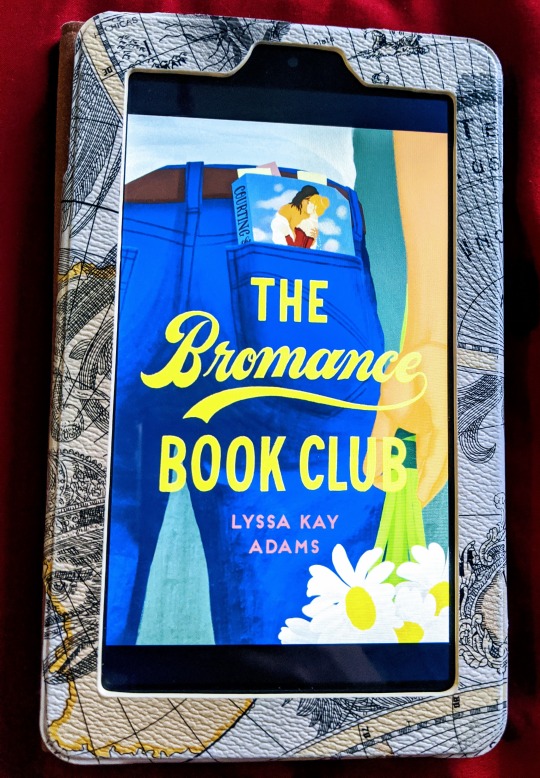
So I’ve been wanting to read this book since before it came out, but just wasn’t in the place to buy it so when I got an email from Amazon saying the Kindle version was on sale for $3 I wasn’t going to pass up the chance. And I’m glad I waited until it was on sale because I was just a little bit disappointed. For the most part, I think it’s once again a case of failing to manage my expectations. If I had gone into this book thinking it was simply a cute rom-com about a failing marriage than I think I would have enjoyed it well enough. But this book was so well talked about I expected something more.
The book club was funnier than I expected with all the men being characters in their own rights and I loved that it presented the opportunity for them to tackle toxic masculinity, gender roles, and feminism. I thought it was interesting that Gavin had a stutter that he was super insecure about because it felt like a twist on the standard athlete romance since he lacked a certain confidence that is usually synonymous with competing in the major leagues.
Additionally, I’m not sure if the twins were absolutely necessary to the story. For the most part they felt like a plot driver because the pregnancy is the reason they got married so quickly in the first place and arguably why they’re marriage lasted as long as it did (though three years really doesn’t feel long enough for the issues they had but whatever) and part of why they’re keen to save their relationship. I think it would have been better if the girls were a little older so they could feel more engaging, but I’m also biased because I’m not a fan of children (specifically toddlers) in romance books. I can see the appeal of babies because they’re cutesy and older kids because they can interact with the adults and provide some comedy, but toddlers are just an awkward age in my opinion.
Finally, the fucking sister pissed me off. I understand Thea and Liv had a lot of childhood issues between their parent’s divorce and general lack of love and guidance, but the fact that Liv turns so quickly on Gavin and doesn’t support her sister when she decides to give him a chance. It started to feel like Thea was going to have to choose between her husband/family and her sister and that wasn’t the kind of energy I needed in my romance book especially in the age of Corona. Of course, it being a romance book in the end it all works out.
Basically, I would recommend this book as a fun romance read about an awkward man trying to save his marriage, but just know what your in for.
Keep reading for some fun and often insightful quotes!
“All spouses become strangers to each other at some point in a marriage,” Del said. “All human beings are a work in progress, and we don’t all change at the same pace. Who knows how many people have gotten divorced simply because they failed to recognize that what they thought were insurmountable problems were actually just temporary phases?”
The need to hit something surged again like a bad case of Twitter rage.
“Men are idiots. We complain that women are so mysterious and shit, and we never know what they want. We fuck up our relationships because we convince ourselves that it’s too hard to figure them out. But the real problem is with us. We think we’re not supposed to feel things and cry and express ourselves. We expect women to do all the emotional labor in a relationship and then act confused when they give up on us.”
“Romance novels are primarily written by women for women, and they’re entirely about how they want to be treated and what they want out of life and in a relationship. We read them to be more comfortable expressing ourselves and to look at things from their perspective.”
“Modern romance novelists use the patriarchal society of old British aristocracy to explore the gender-based limitations placed on women today in both the professional and personal spheres. That shit is feminist as fuck.”
If a man wants to leave you, wave goodbye and lock the doors. You’ve got better things to do than chase a lost cause.
The backlash against the PSL is a perfect example of how toxic masculinity permeates even the most mundane things in life. If masses of women like something, our society automatically begins to mock them. Just like romance novels. If women like them, they must be a joke, right?
“You don’t wink.” “That’s not true.” “It absolutely is true. A woman remembers every time a man winks at her, because we love winking. It’s like catnip. Wink at us, and we roll over and start purring. You haven’t winked at me in a long time.” “Then I’m an idiot.” Gavin slowly lowered his gaze to lips. “Because I wouldn’t mind hearing you purr.”
Thea blinked several times and tore her gaze away from Gavin, who was studying her again like he did during the theater. Like he did on Saturday. As if seeing her for the first time. Maybe he was. It had been years since she felt like he saw her at all.
She had changed into a pair of sweatpants and his old Huntsville Rockets minor league sweatshirt, the one she’d claimed shortly after they started dating. He’d lost all coherent thought the first time he saw her in it. Something regressively possessive stole over him, as if he’d claimed her. Officially. With a sweatshirt.
“It means that whatever happened to your wife before she met you plays a role in who she is today,” Malcolm said. “We are all the sum total of our experiences at any given time, and our reactions to things are shaped by them. Just like in romance novels. Whatever a character went through before the start of the book will eventually determine how they react to things that happen in the book.” “But we’re talking about my real life here. Not a book.” “Same principles apply,” Malcolm said. “That’s why fiction resonates with people. It speaks to universal truths.”
“‘More than anything, she feared that she would awaken some morning and realize her entire life had passed her by,’” he read. “‘That at some point, she had become less than. Less than w-w-what she used to imagine. Less than w-wh-what she used to hope for. Nothing more than a silent accessory to a man. Nothing more than her own mother, a passive face at a glittering table.’”
"The point of all this is to court her, Gavin. Not seduce her.” “What’s the difference?” Mack snorted again. “It’s a fucking miracle you got married at all.” Gavin flipped him off. “The difference,” Malcolm said, “is to make her want you, not prove how much you want her.”
“Something has changed. What is it?” He offered to deal with Dad for me. He kissed me and made me want to forget everything bad. He made pancakes with the girls. Thea shook her head. “Nothing.”
"We women must steal our power where we can, and in the world of the ton, that power is sadly limited to the reduction of other women.”
“I do not require compliments, my lord. I’m well aware of my own attractiveness, which, of course, no lady is supposed to admit, but such is the world. English society seems to rest upon the requirement that women are pitted against each other until we all emerge envious of the other.”
“If there was a website where strange men posted thousands of pictures of you, yeah, I w-wouldn’t get used to it.” “That’s different. I’m not famous like you are.” “You’re the most important person in the w-w-world to me, so I beg to differ.”
“But we must find a way to produce and enjoy content that celebrates the fierceness of women without, at the same time, belittling a woman’s ability to decipher fact from fiction.”
#bromance book club#lyssa kay adams#adult romance#romance books#books#book club#booklr#book blog#quotes#book quotes
1 note
·
View note